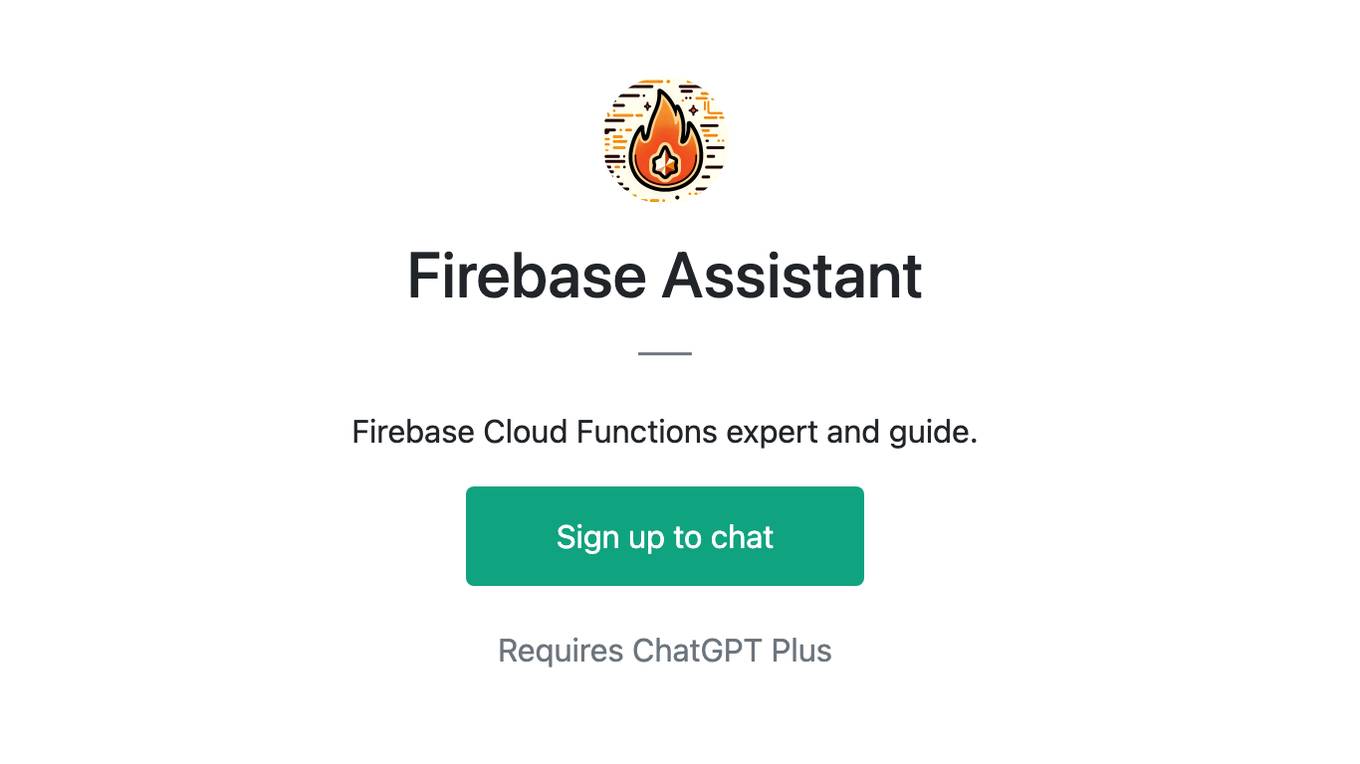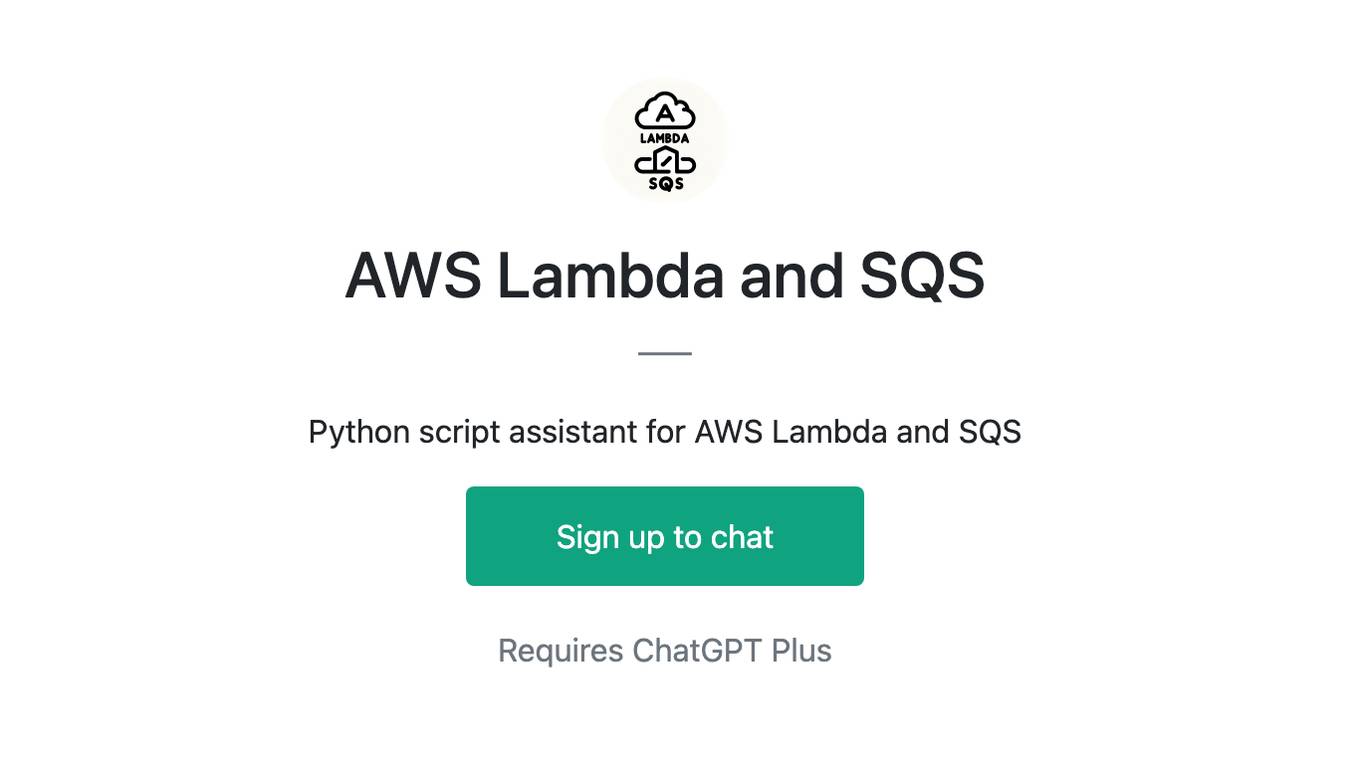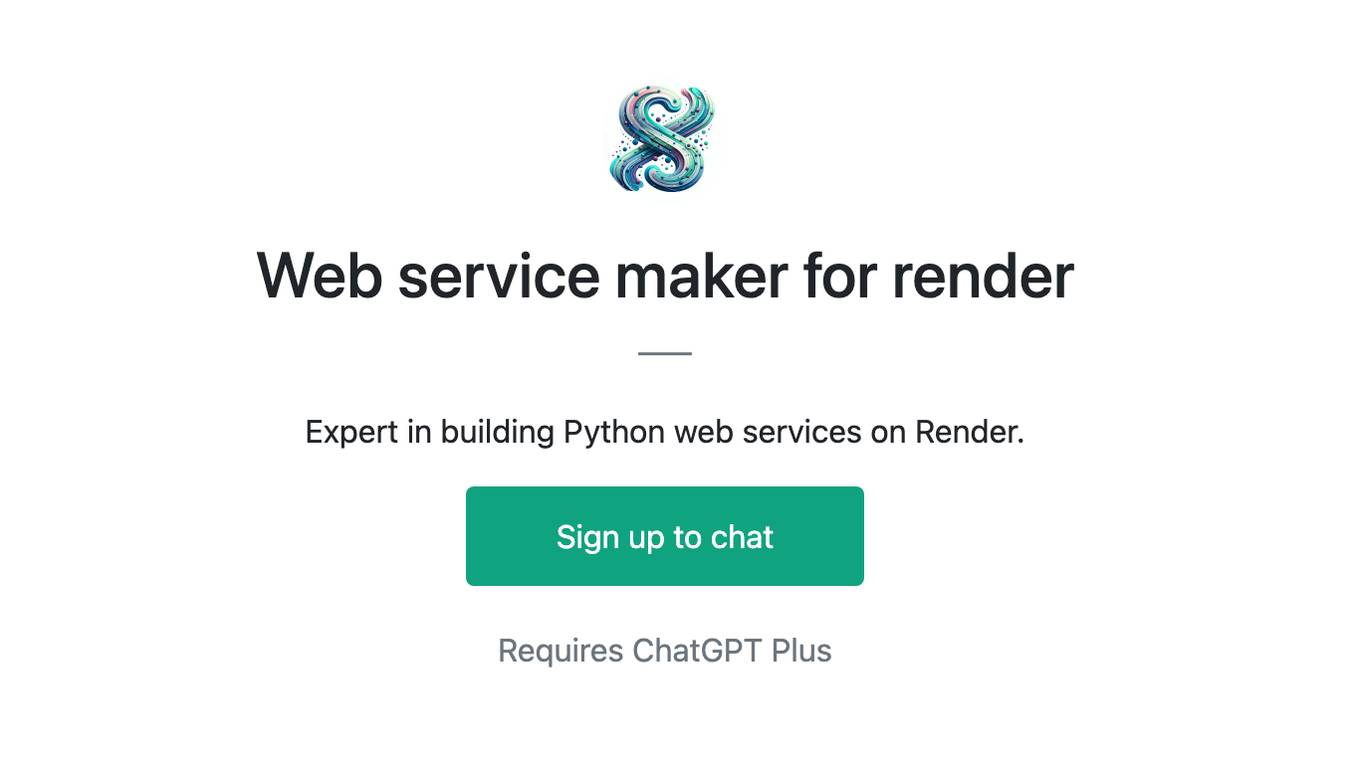Best AI tools for< serverless development >
17 - AI tool Sites
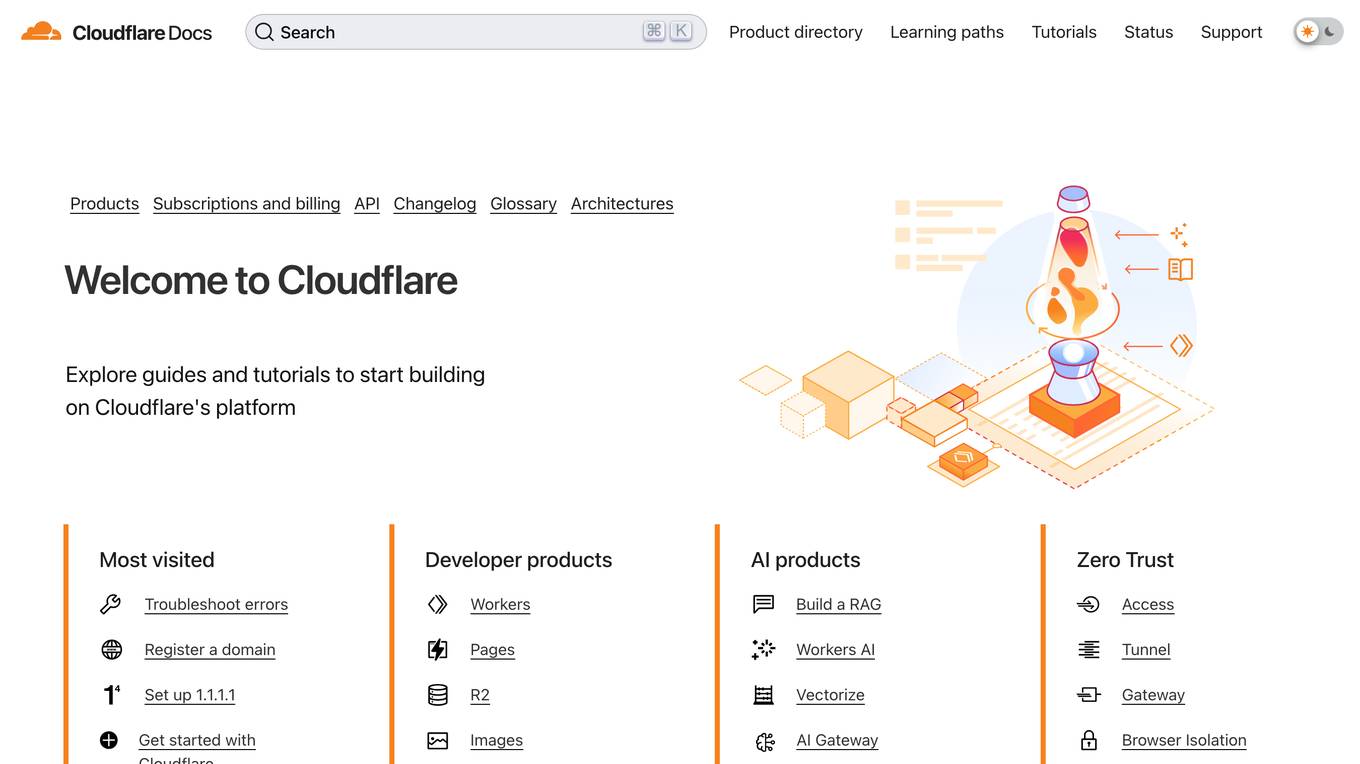
Cloudflare
Cloudflare is a cloud-based platform that provides a variety of services to help businesses improve their online presence, including website security, content delivery, and domain name registration. Cloudflare's developer platform provides a serverless execution environment that allows developers to create and deploy applications without having to manage infrastructure. Cloudflare also offers a variety of AI-powered products, such as Workers AI, Vectorize AI, and Gateway AI, that can help businesses automate tasks and improve their operations.
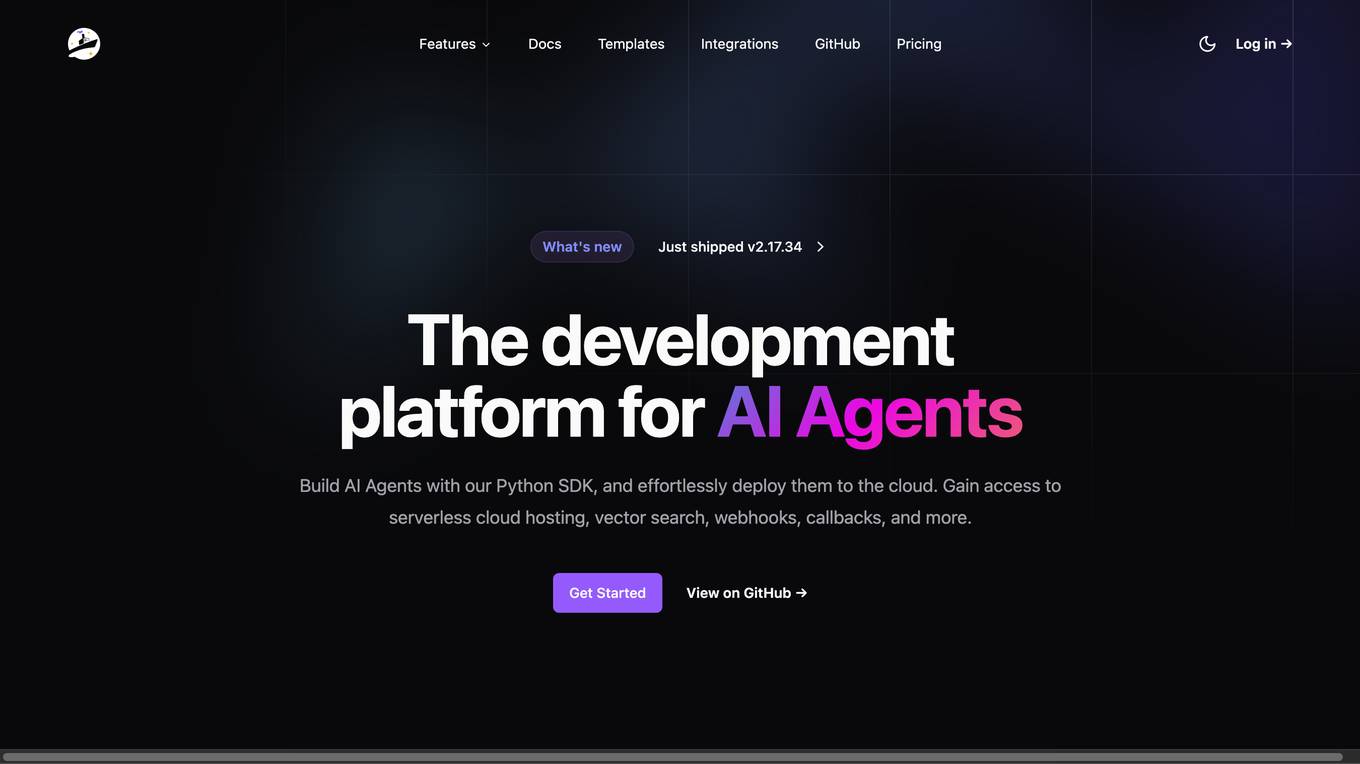
Steamship
Steamship is a development platform for building and deploying AI agents. It provides a Python SDK for building agents, a CLI for deploying them to the cloud, and access to serverless cloud hosting, vector search, webhooks, callbacks, and more.
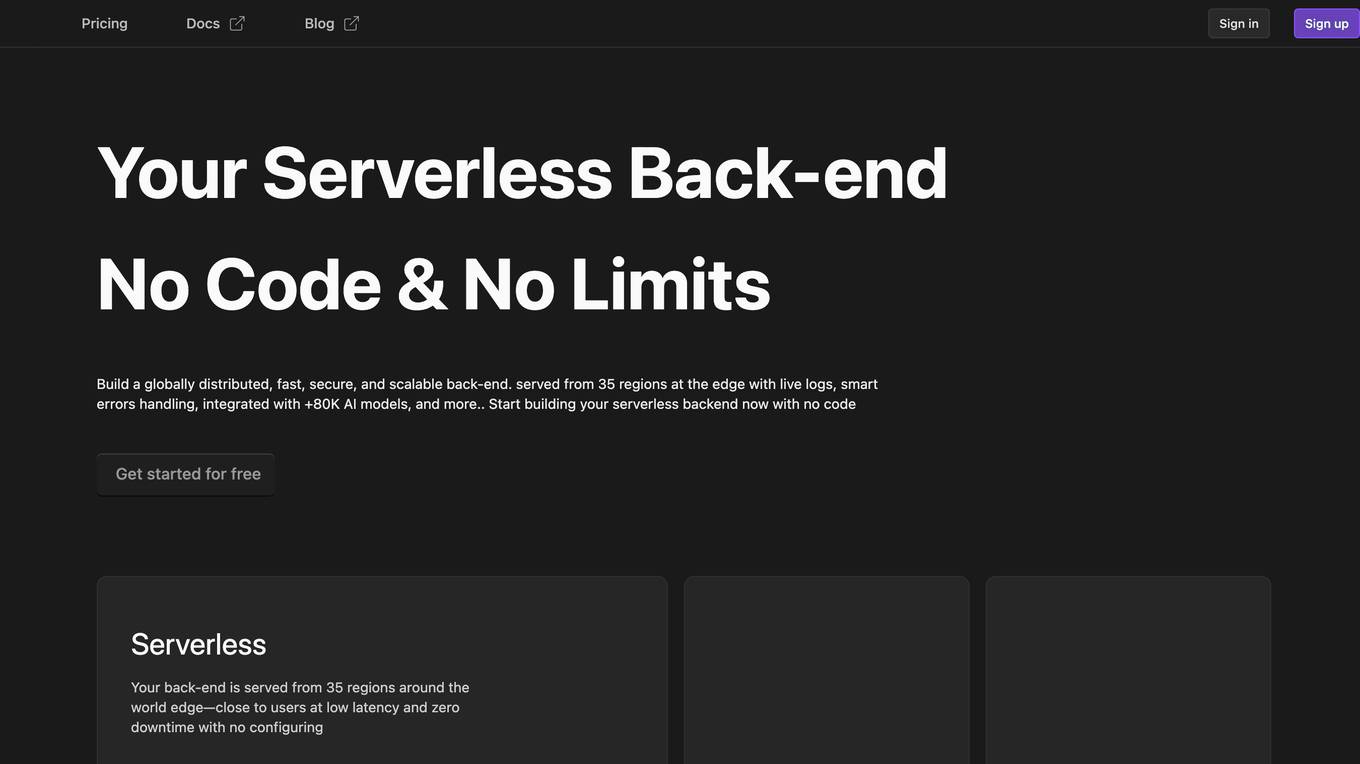
Koxy AI
Koxy AI is a no-code, AI-powered serverless backend platform that allows developers to build and deploy globally distributed, fast, secure, and scalable backends. It offers a wide range of features, including a drag-and-drop builder, real-time data synchronization, and integration with over 80,000 AI models. Koxy AI is designed to make backend development faster, easier, and more accessible, even for those with no coding experience.
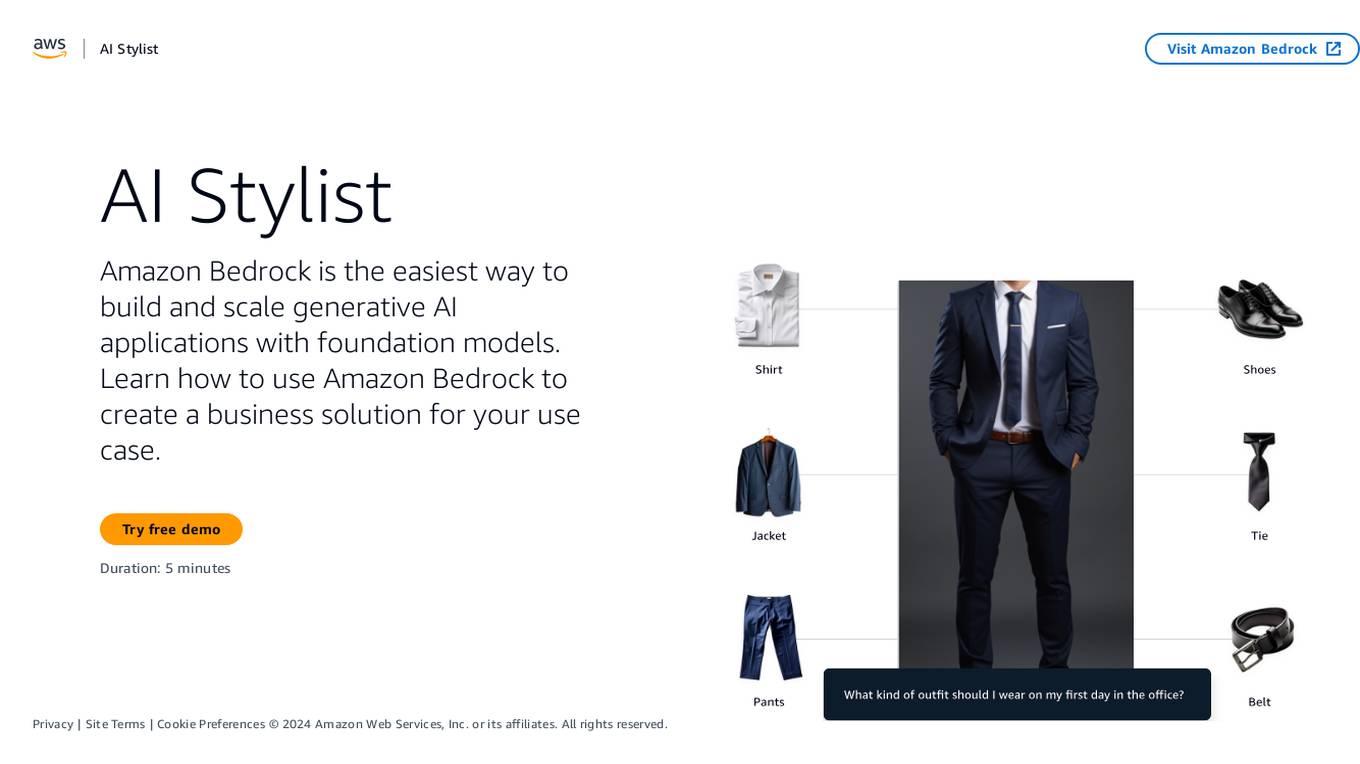
Amazon Bedrock
Amazon Bedrock is a cloud-based platform that enables developers to build, deploy, and manage serverless applications. It provides a fully managed environment that takes care of the infrastructure and operations, so developers can focus on writing code. Bedrock also offers a variety of tools and services to help developers build and deploy their applications, including a code editor, a debugger, and a deployment pipeline.

Convex
Convex is a fullstack TypeScript development platform that provides a flexible, 100% ACID compliant database. It allows developers to build real-time, reactive applications with ease. Convex also offers a variety of features such as actions, jobs, and webhooks that make it easy to integrate with third-party services. Additionally, Convex provides a variety of resources to help developers get started, including documentation, tutorials, and a community forum.
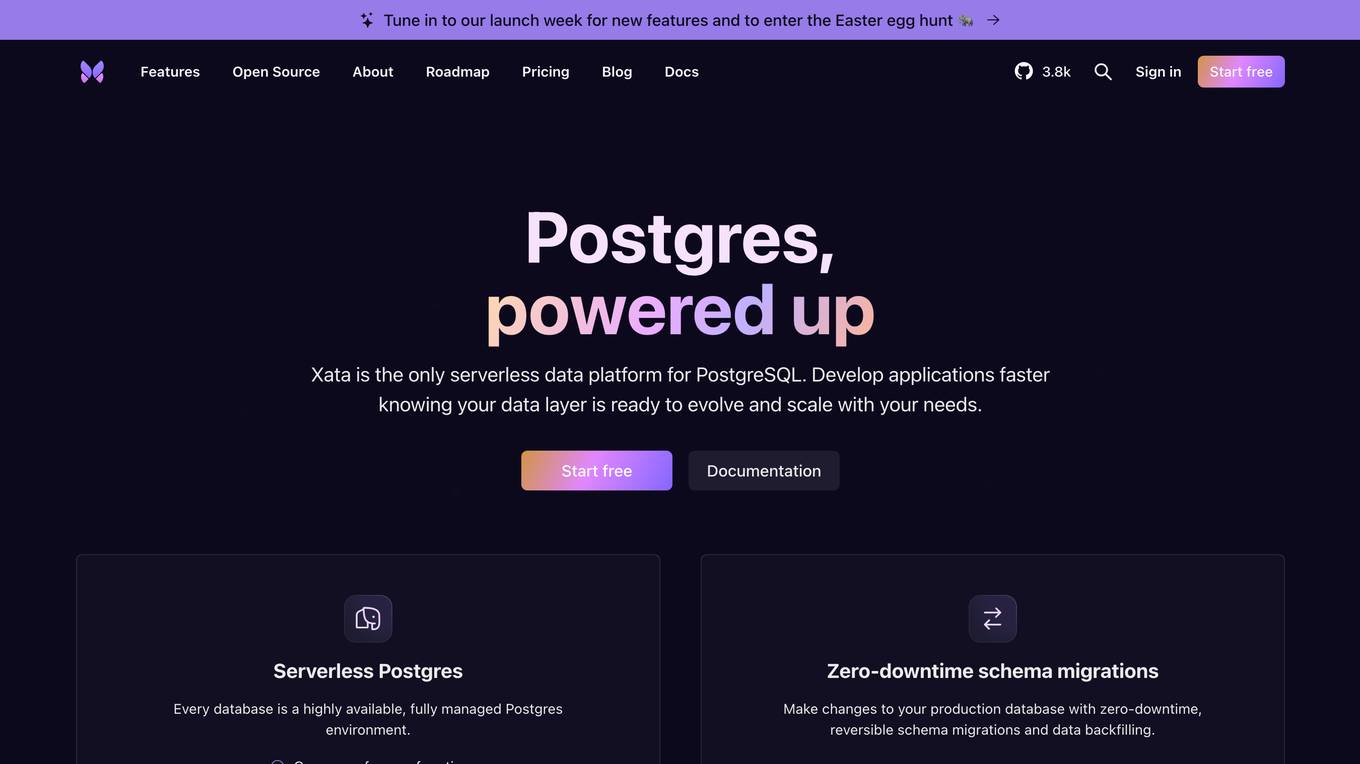
Xata
Xata is a serverless data platform for PostgreSQL that provides a range of features to make application development faster and easier. These features include schema migrations, file attachments, full-text search, branching, and generative AI. Xata is designed to be the ideal database for application development, with a focus on code simplicity and extensibility. It is also built on open source, so developers can collaborate with the community to drive innovative ideas.
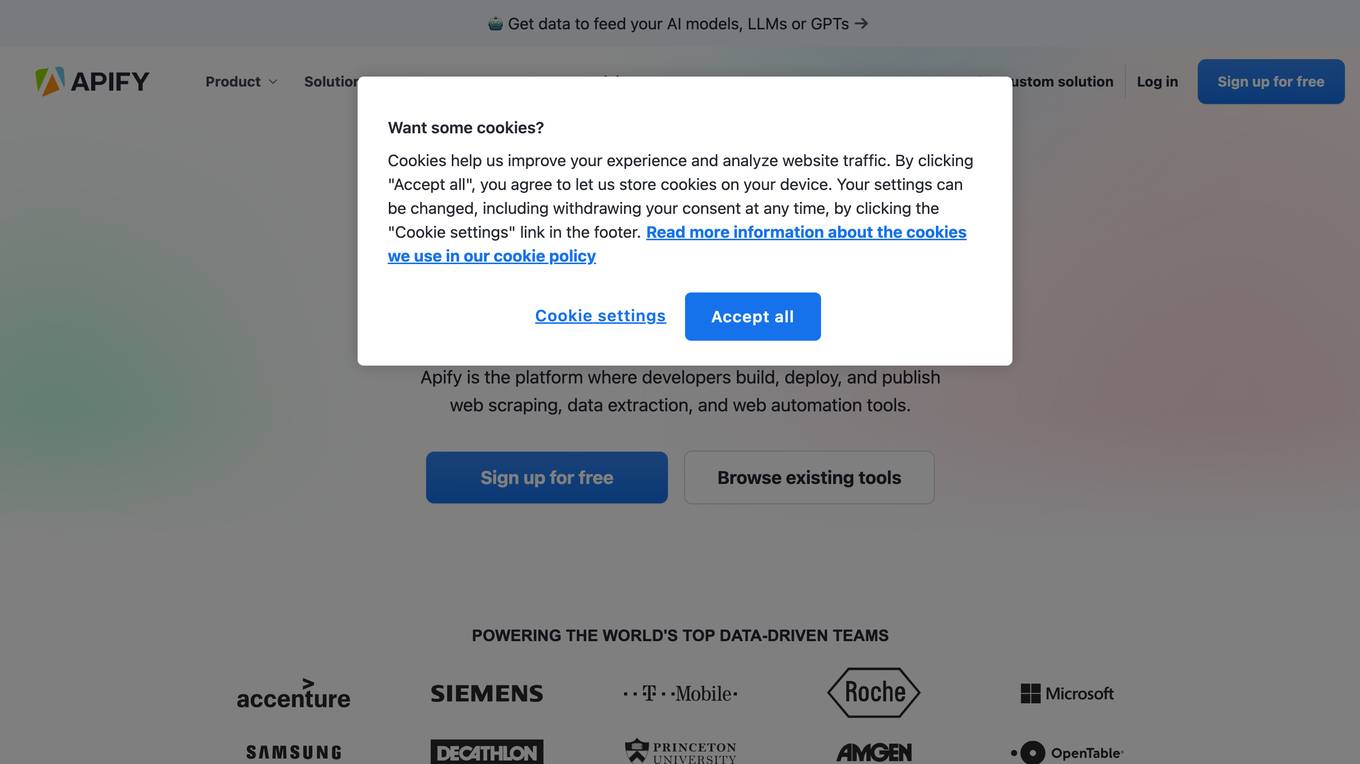
Apify
Apify is a full-stack web scraping and data extraction platform that enables developers to build, deploy, and publish web scraping, data extraction, and web automation tools. It provides a range of features and advantages, including: * **Open-source tools:** Apify offers a variety of open-source tools, such as Crawlee, a reliable web scraping library, and code templates, to simplify the development of scraping projects. * **Deployment to Apify:** Developers can easily turn their code into Apify Actors, which are serverless microapps that can be deployed to the Apify cloud with a single CLI command. * **Never get blocked:** Apify provides a large pool of datacenter and residential proxies, as well as smart IP address rotation with human-like browser fingerprints, to prevent blocking during web scraping. * **Store and share crawling results:** Apify offers distributed queues of URLs to crawl, as well as storage for structured data and binary files, with the ability to export datasets in various formats. * **Integrations:** Apify provides ready-made integrations with hundreds of apps, as well as the ability to set up custom integrations using webhooks and its API. * **Publish your Actors:** Developers can share their Actors on the Apify Store and earn money.
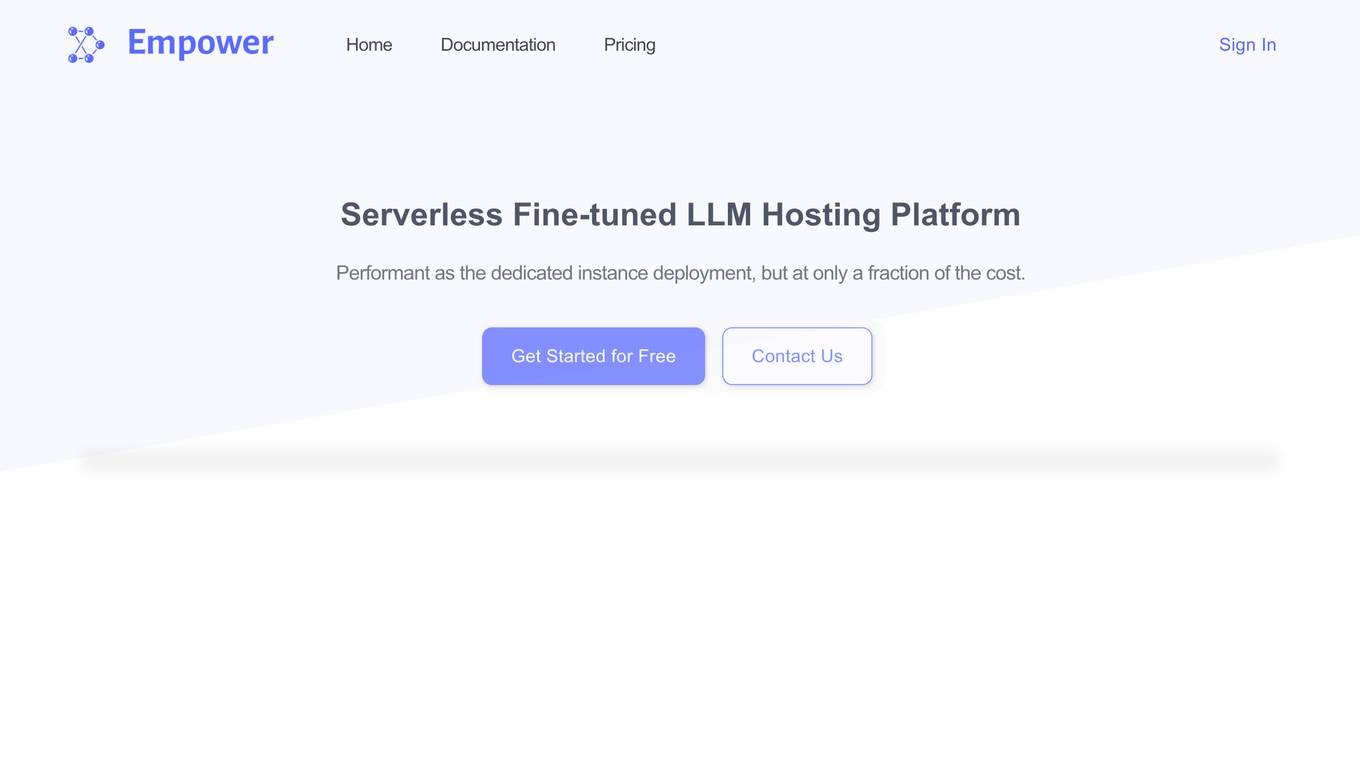
Empower
Empower is a serverless fine-tuned LLM hosting platform that provides cost-effective LoRA serving without compromising performance. It is compatible with any PEFT-based LoRAs, allowing users to train their models anywhere and deploy them on Empower effortlessly. Empower's technology ensures a sub-second code start time for LoRAs, eliminating cold starts. Users only pay for what they use, with no expensive dedicated instance fees.

Modal
Modal is a high-performance cloud platform for developers, particularly those working with AI data and ML teams. It provides a serverless platform for running generative AI models, large-scale batch jobs, job queues, and more. Modal allows users to bring their own code and leverage the platform's infrastructure to run their applications. Key features include fast cold boots, autoscaling, custom container images, hardware specifications, network volumes, key-value stores, queues, job scheduling, web endpoints, observability, and security. Modal is designed for large-scale workloads and offers pay-as-you-go pricing. It is suitable for various use cases, including generative AI, AI inference, fine-tuning, batch processing, and more.
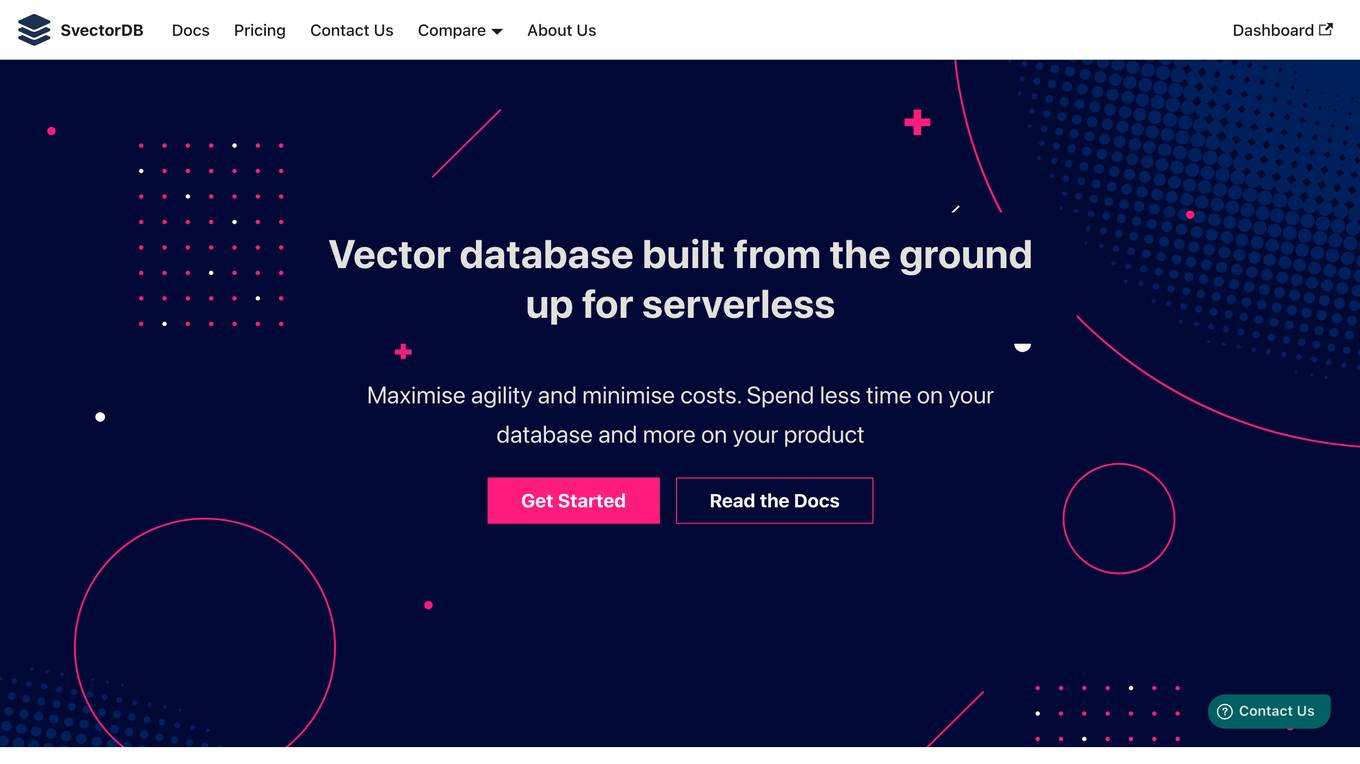
SvectorDB
SvectorDB is a vector database built from the ground up for serverless applications. It is designed to be highly scalable, performant, and easy to use. SvectorDB can be used for a variety of applications, including recommendation engines, document search, and image search.
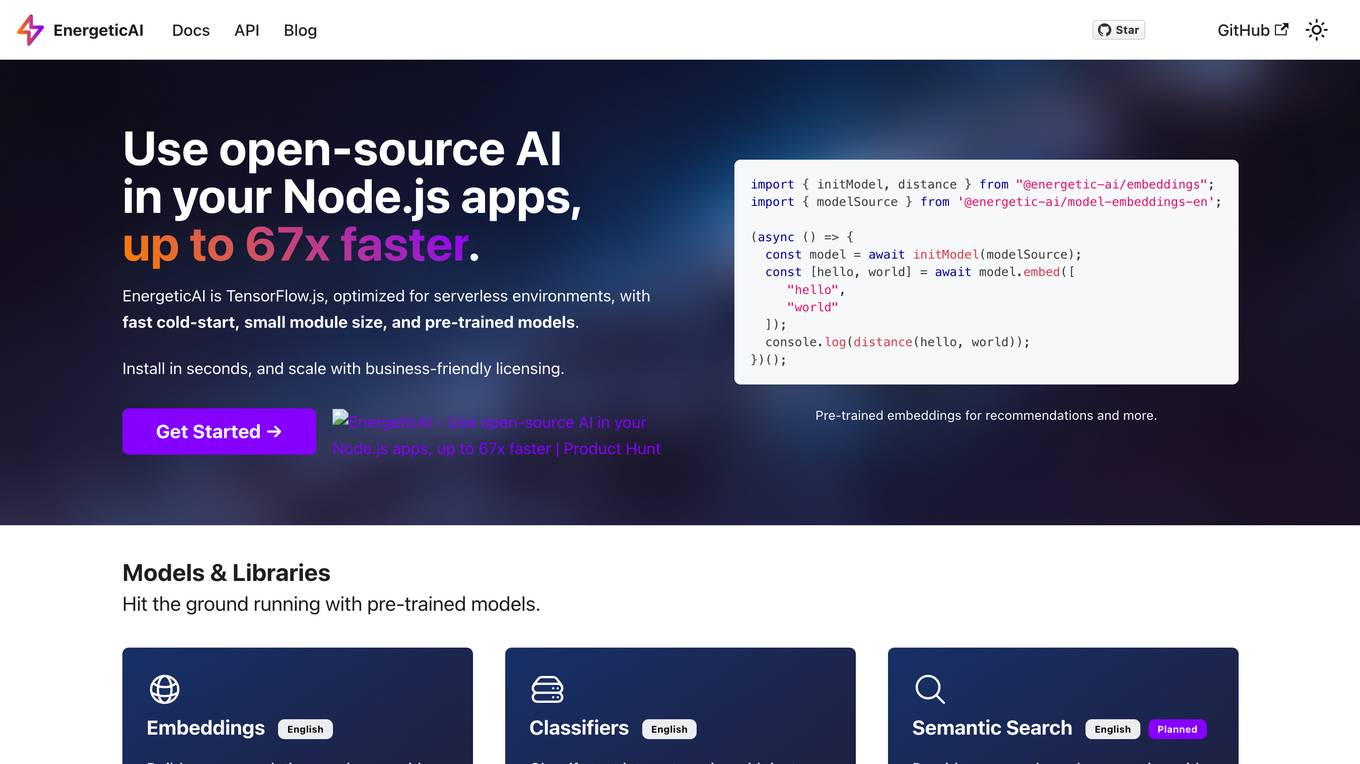
EnergeticAI
EnergeticAI is an open-source AI library that can be used in Node.js applications. It is optimized for serverless environments and provides fast cold-start, small module size, and pre-trained models. EnergeticAI can be used for a variety of tasks, including building recommendations, classifying text, and performing semantic search.

Cerebrium
Cerebrium is a serverless GPU infrastructure for machine learning. It allows developers to run machine learning models in the cloud scalably and performantly, without having to worry about managing infrastructure. Cerebrium provides a variety of features to make it easy to develop and deploy machine learning models, including GPU variety, infrastructure as code, volume storage, secrets integration, hot reloading, and streaming endpoints.
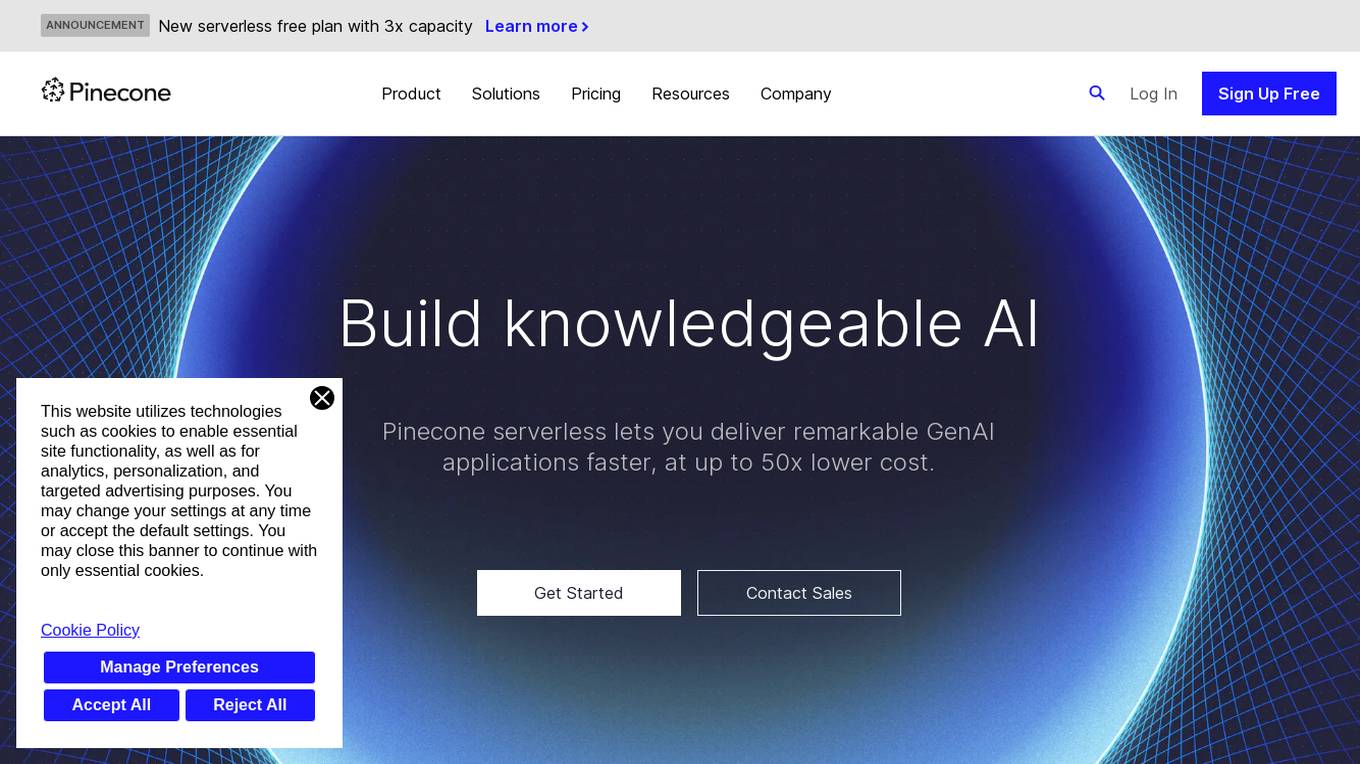
Pinecone
Pinecone is a vector database designed to build knowledgeable AI applications. It offers a serverless platform with high capacity and low cost, enabling users to perform low-latency vector search for various AI tasks. Pinecone is easy to start and scale, allowing users to create an account, upload vector embeddings, and retrieve relevant data quickly. The platform combines vector search with metadata filters and keyword boosting for better application performance. Pinecone is secure, reliable, and cloud-native, making it suitable for powering mission-critical AI applications.
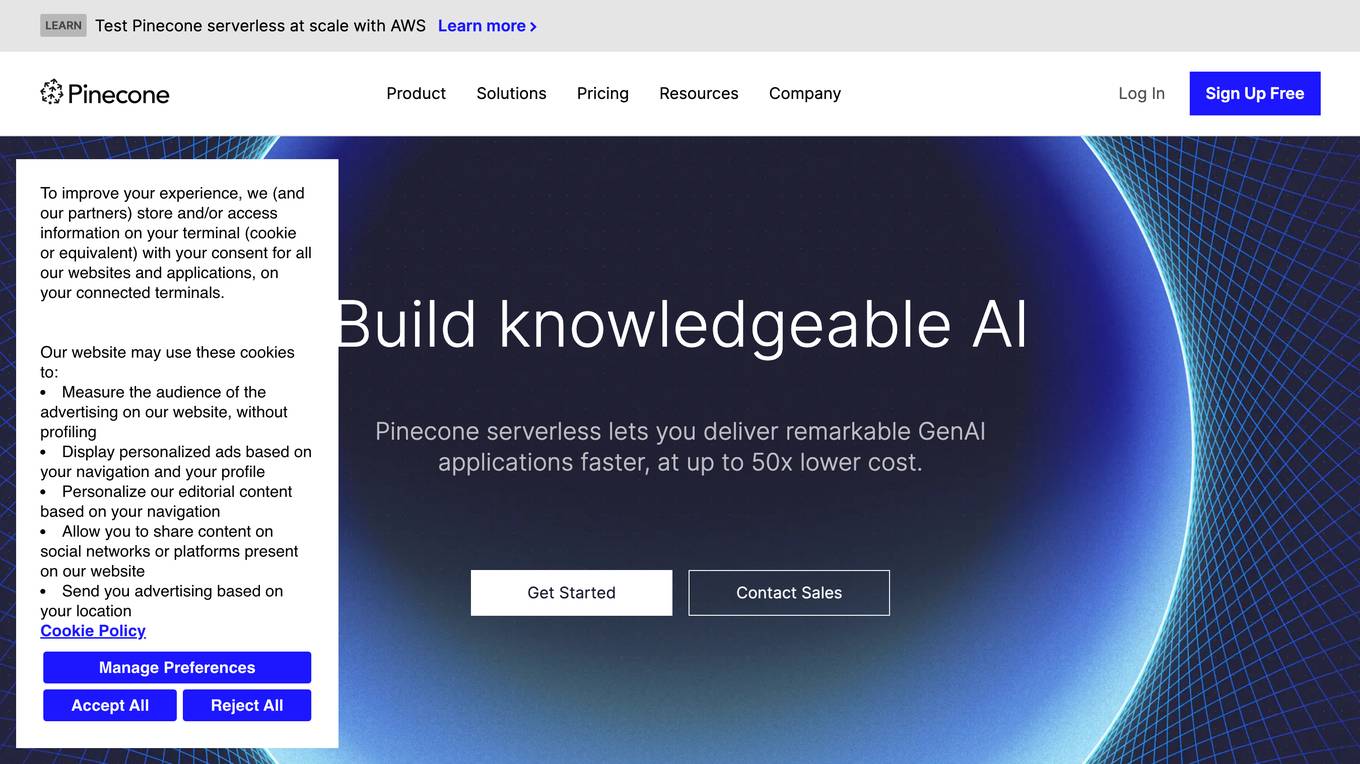
Pinecone
Pinecone is a vector database that helps power AI for the world's best companies. It is a serverless database that lets you deliver remarkable GenAI applications faster, at up to 50x lower cost. Pinecone is easy to use and can be integrated with your favorite cloud provider, data sources, models, frameworks, and more.
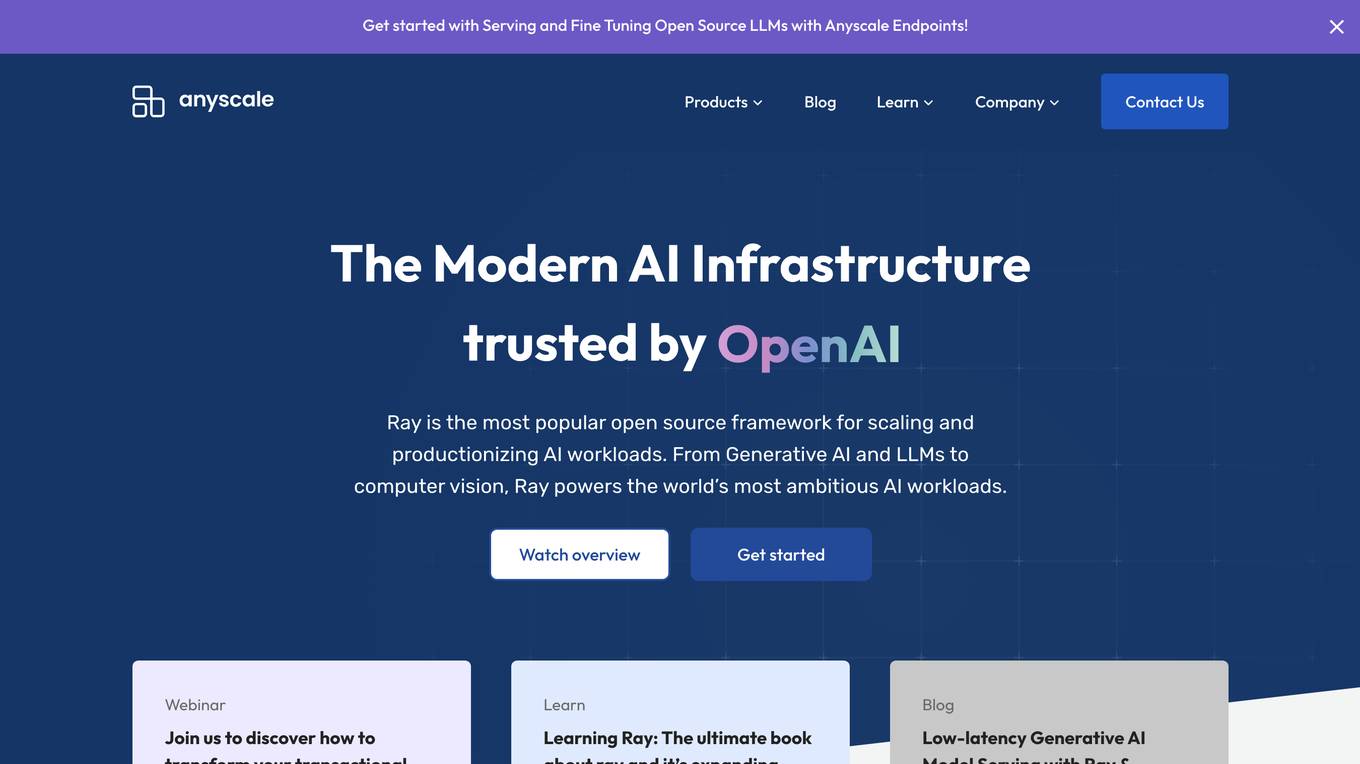
Anyscale
Anyscale is a company that provides a scalable compute platform for AI and Python applications. Their platform includes a serverless API for serving and fine-tuning open LLMs, a private cloud solution for data privacy and governance, and an open source framework for training, batch, and real-time workloads. Anyscale's platform is used by companies such as OpenAI, Uber, and Spotify to power their AI workloads.
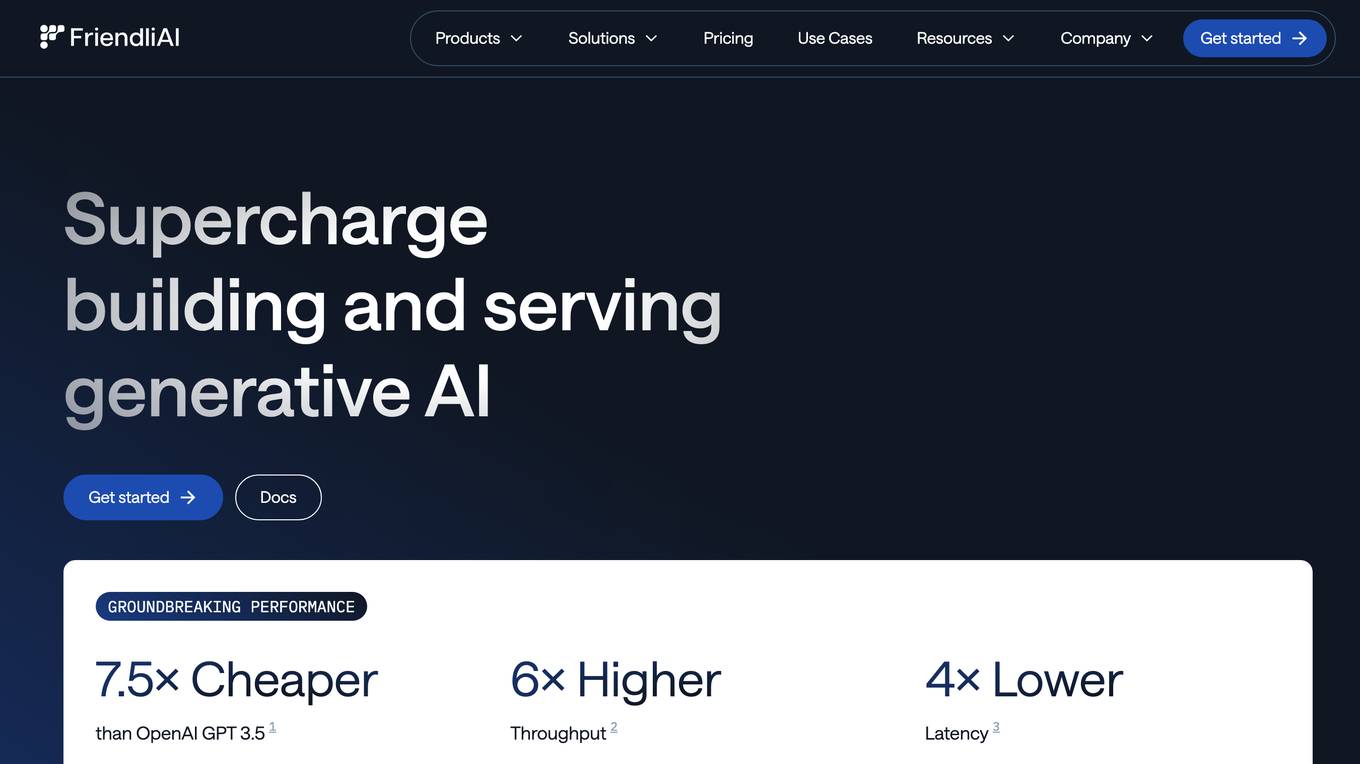
FriendliAI
FriendliAI is a generative AI infrastructure company that provides a suite of products and services to help developers build and deploy generative AI applications. FriendliAI's products include Friendli Engine, a high-performance generative AI engine; Friendli Serverless Endpoints, a fast and affordable API for open-source LLMs and LMMs; Friendli Dedicated Endpoints, a managed service for running custom LLMs; and Friendli Container, a solution for serving LLMs in private environments. FriendliAI's services include consulting, training, and support to help developers get the most out of their generative AI projects.
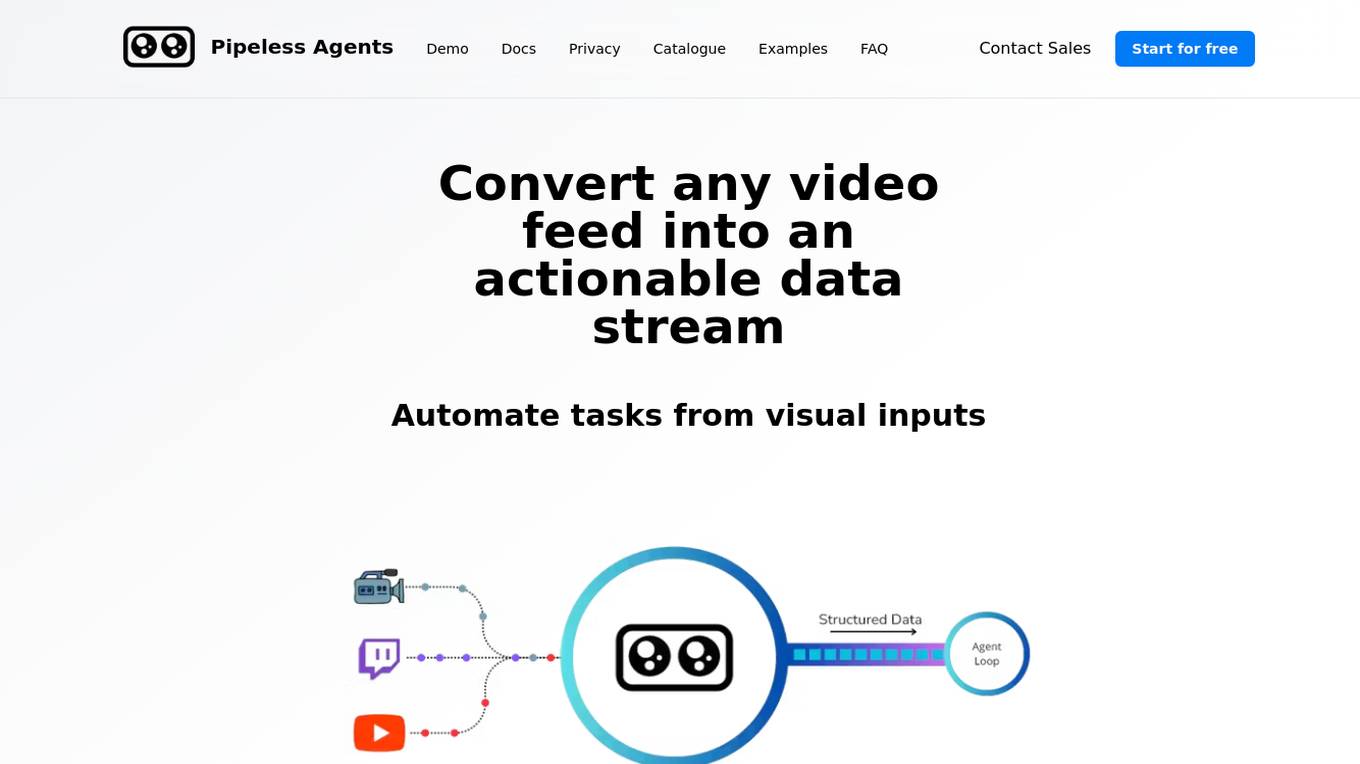
Pipeless Agents
Pipeless Agents is a platform that allows users to convert any video feed into an actionable data stream, enabling automation of tasks based on visual inputs. It serves as a serverless platform for Vision AI, offering the ability to create projects, connect video sources, and customize agents for specific needs. With a focus on simplicity and efficiency, Pipeless Agents empowers users to extract structured data from various video sources and automate processes with minimal coding requirements.
20 - Open Source AI Tools

serverless-chat-langchainjs
This sample shows how to build a serverless chat experience with Retrieval-Augmented Generation using LangChain.js and Azure. The application is hosted on Azure Static Web Apps and Azure Functions, with Azure Cosmos DB for MongoDB vCore as the vector database. You can use it as a starting point for building more complex AI applications.
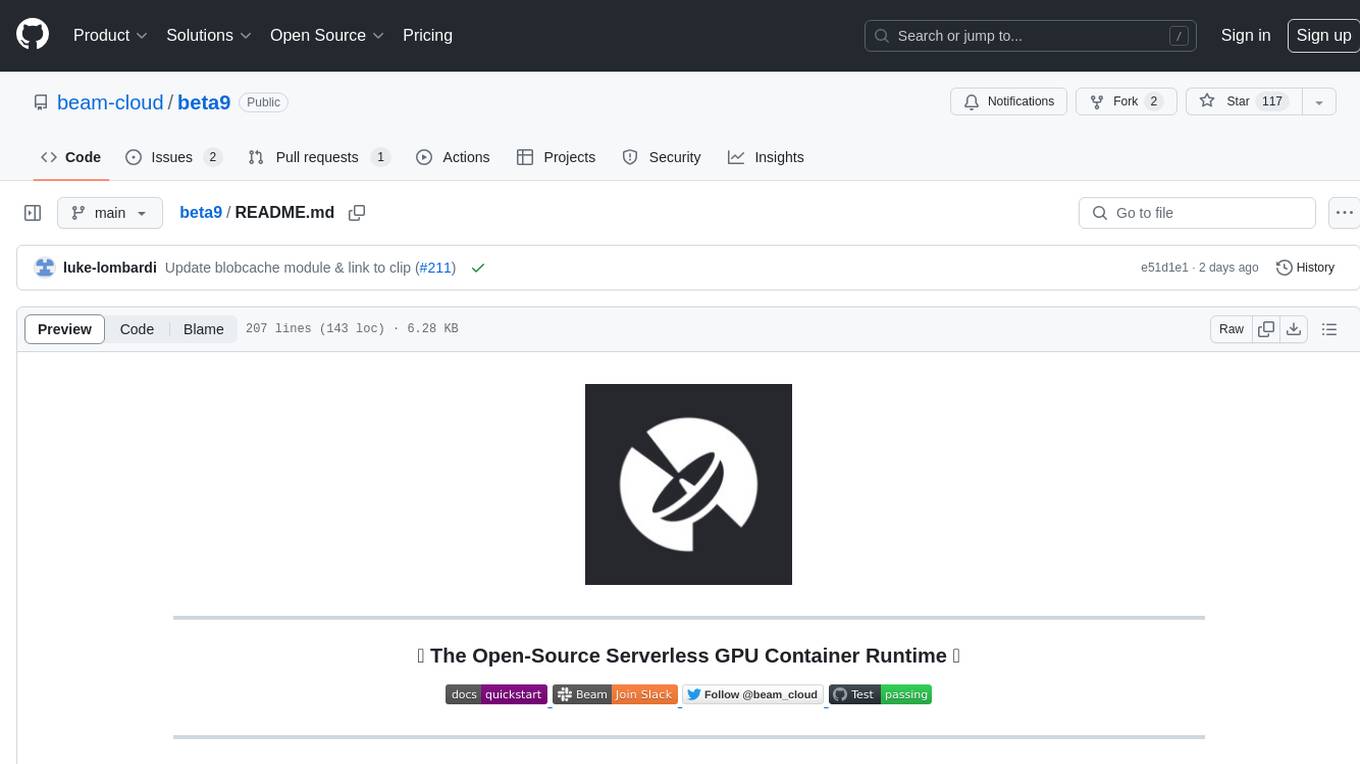
beta9
Beta9 is an open-source platform for running scalable serverless GPU workloads across cloud providers. It allows users to scale out workloads to thousands of GPU or CPU containers, achieve ultrafast cold-start for custom ML models, automatically scale to zero to pay for only what is used, utilize flexible distributed storage, distribute workloads across multiple cloud providers, and easily deploy task queues and functions using simple Python abstractions. The platform is designed for launching remote serverless containers quickly, featuring a custom, lazy loading image format backed by S3/FUSE, a fast redis-based container scheduling engine, content-addressed storage for caching images and files, and a custom runc container runtime.
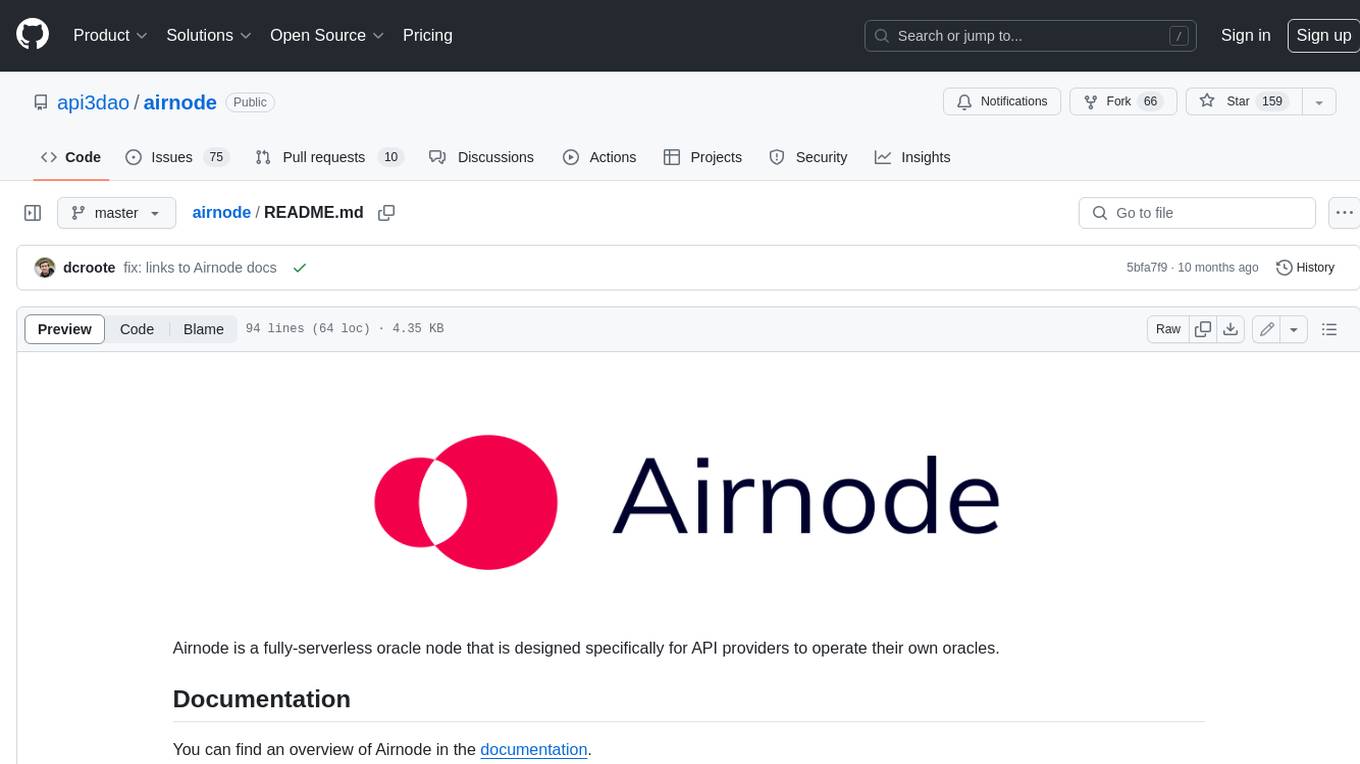
airnode
Airnode is a fully-serverless oracle node that is designed specifically for API providers to operate their own oracles.

pluto
Pluto is a development tool dedicated to helping developers **build cloud and AI applications more conveniently** , resolving issues such as the challenging deployment of AI applications and open-source models. Developers are able to write applications in familiar programming languages like **Python and TypeScript** , **directly defining and utilizing the cloud resources necessary for the application within their code base** , such as AWS SageMaker, DynamoDB, and more. Pluto automatically deduces the infrastructure resource needs of the app through **static program analysis** and proceeds to create these resources on the specified cloud platform, **simplifying the resources creation and application deployment process**.
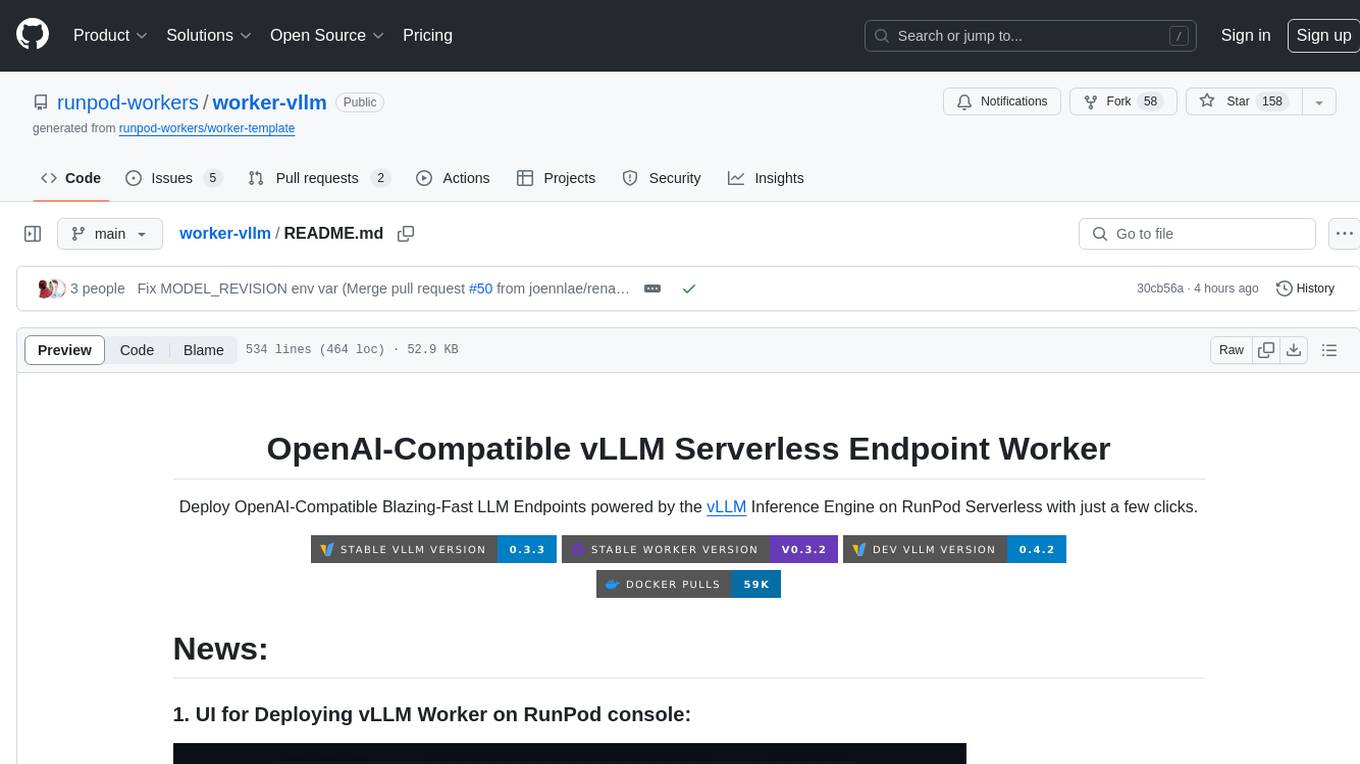
worker-vllm
The worker-vLLM repository provides a serverless endpoint for deploying OpenAI-compatible vLLM models with blazing-fast performance. It supports deploying various model architectures, such as Aquila, Baichuan, BLOOM, ChatGLM, Command-R, DBRX, DeciLM, Falcon, Gemma, GPT-2, GPT BigCode, GPT-J, GPT-NeoX, InternLM, Jais, LLaMA, MiniCPM, Mistral, Mixtral, MPT, OLMo, OPT, Orion, Phi, Phi-3, Qwen, Qwen2, Qwen2MoE, StableLM, Starcoder2, Xverse, and Yi. Users can deploy models using pre-built Docker images or build custom images with specified arguments. The repository also supports OpenAI compatibility for chat completions, completions, and models, with customizable input parameters. Users can modify their OpenAI codebase to use the deployed vLLM worker and access a list of available models for deployment.
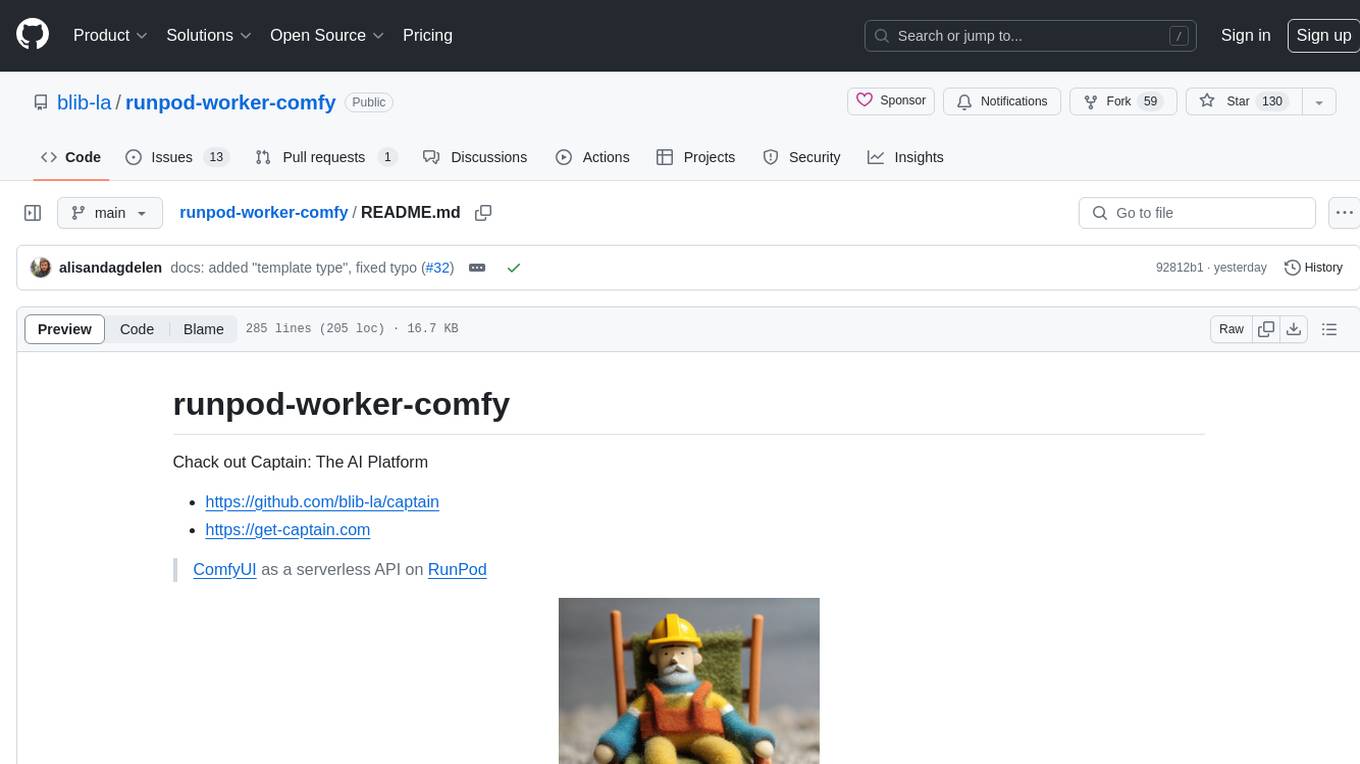
runpod-worker-comfy
runpod-worker-comfy is a serverless API tool that allows users to run any ComfyUI workflow to generate an image. Users can provide input images as base64-encoded strings, and the generated image can be returned as a base64-encoded string or uploaded to AWS S3. The tool is built on Ubuntu + NVIDIA CUDA and provides features like built-in checkpoints and VAE models. Users can configure environment variables to upload images to AWS S3 and interact with the RunPod API to generate images. The tool also supports local testing and deployment to Docker hub using Github Actions.
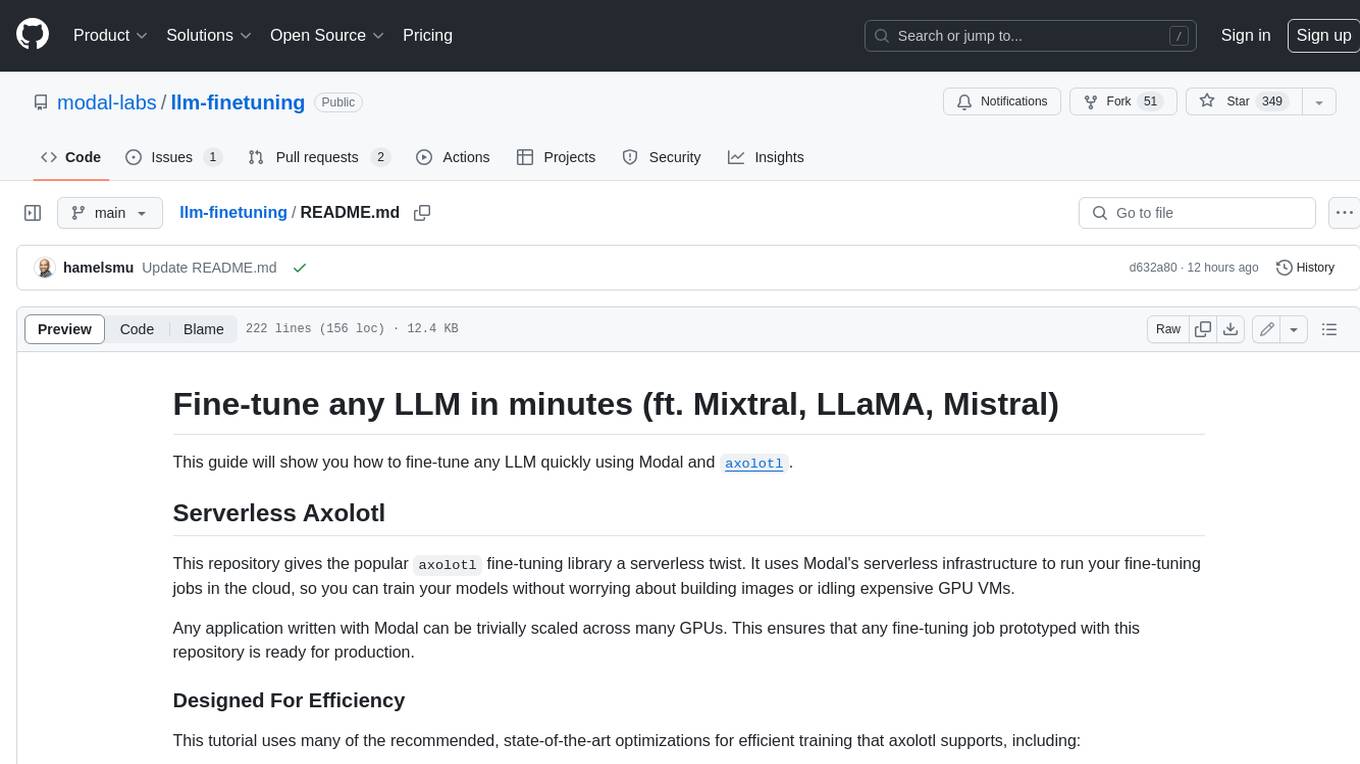
llm-finetuning
llm-finetuning is a repository that provides a serverless twist to the popular axolotl fine-tuning library using Modal's serverless infrastructure. It allows users to quickly fine-tune any LLM model with state-of-the-art optimizations like Deepspeed ZeRO, LoRA adapters, Flash attention, and Gradient checkpointing. The repository simplifies the fine-tuning process by not exposing all CLI arguments, instead allowing users to specify options in a config file. It supports efficient training and scaling across multiple GPUs, making it suitable for production-ready fine-tuning jobs.

embedJs
EmbedJs is a NodeJS framework that simplifies RAG application development by efficiently processing unstructured data. It segments data, creates relevant embeddings, and stores them in a vector database for quick retrieval.
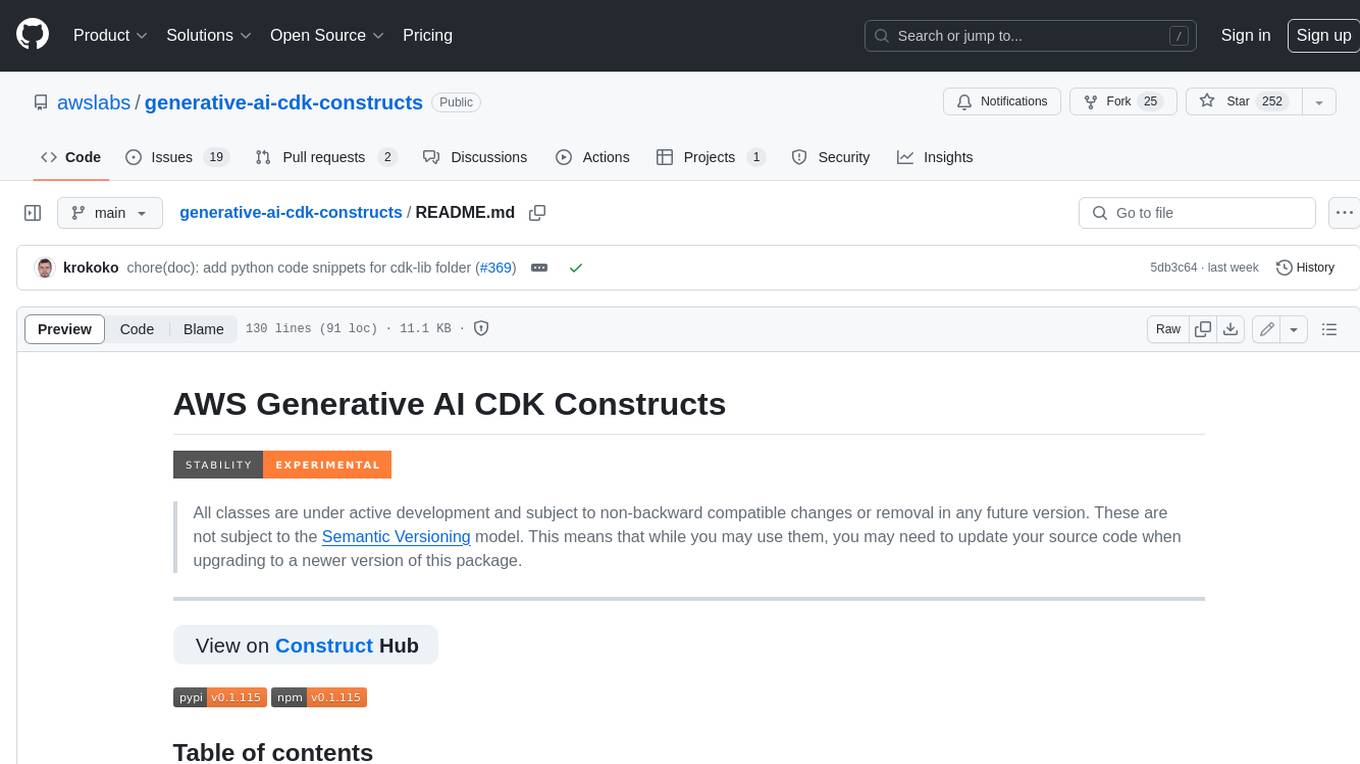
generative-ai-cdk-constructs
The AWS Generative AI Constructs Library is an open-source extension of the AWS Cloud Development Kit (AWS CDK) that provides multi-service, well-architected patterns for quickly defining solutions in code to create predictable and repeatable infrastructure, called constructs. The goal of AWS Generative AI CDK Constructs is to help developers build generative AI solutions using pattern-based definitions for their architecture. The patterns defined in AWS Generative AI CDK Constructs are high level, multi-service abstractions of AWS CDK constructs that have default configurations based on well-architected best practices. The library is organized into logical modules using object-oriented techniques to create each architectural pattern model.
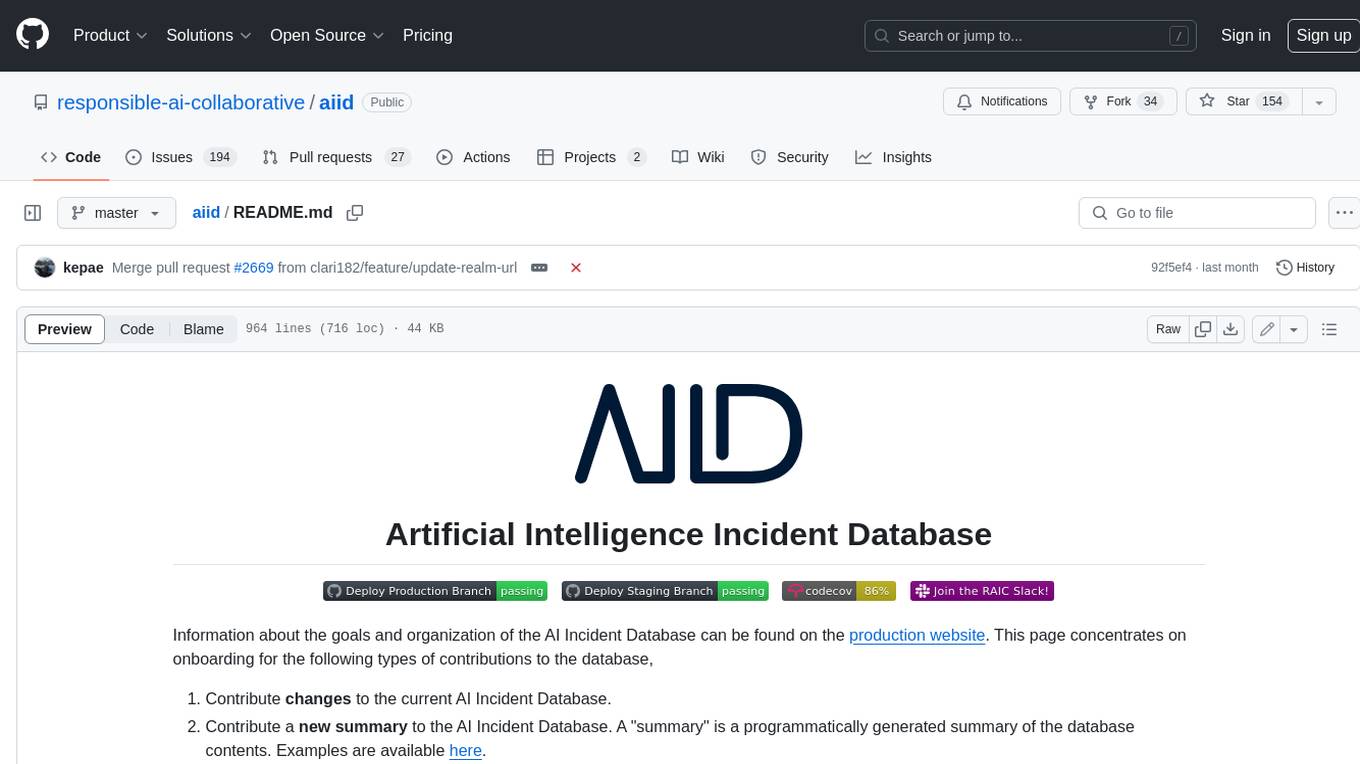
aiid
The Artificial Intelligence Incident Database (AIID) is a collection of incidents involving the development and use of artificial intelligence (AI). The database is designed to help researchers, policymakers, and the public understand the potential risks and benefits of AI, and to inform the development of policies and practices to mitigate the risks and promote the benefits of AI. The AIID is a collaborative project involving researchers from the University of California, Berkeley, the University of Washington, and the University of Toronto.
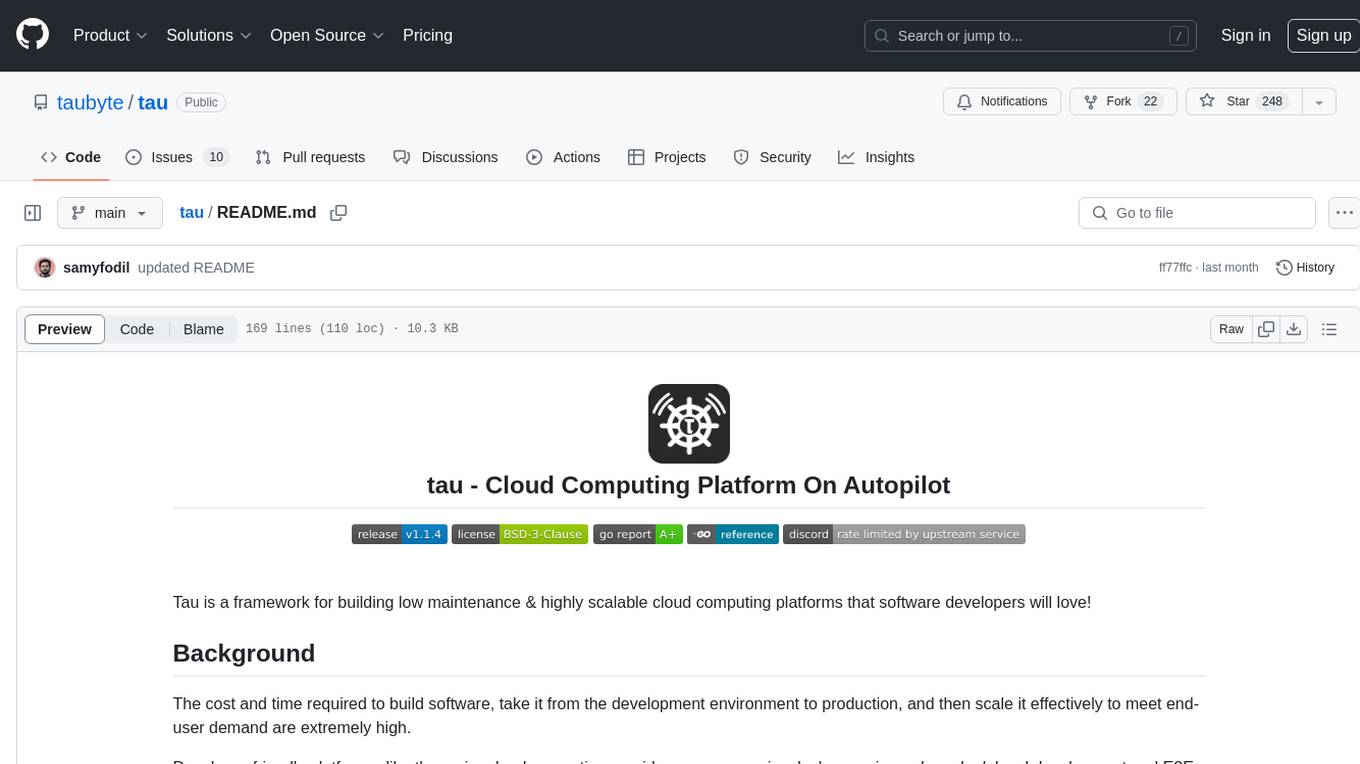
tau
Tau is a framework for building low maintenance & highly scalable cloud computing platforms that software developers will love. It aims to solve the high cost and time required to build, deploy, and scale software by providing a developer-friendly platform that offers autonomy and flexibility. Tau simplifies the process of building and maintaining a cloud computing platform, enabling developers to achieve 'Local Coding Equals Global Production' effortlessly. With features like auto-discovery, content-addressing, and support for WebAssembly, Tau empowers users to create serverless computing environments, host frontends, manage databases, and more. The platform also supports E2E testing and can be extended using a plugin system called orbit.
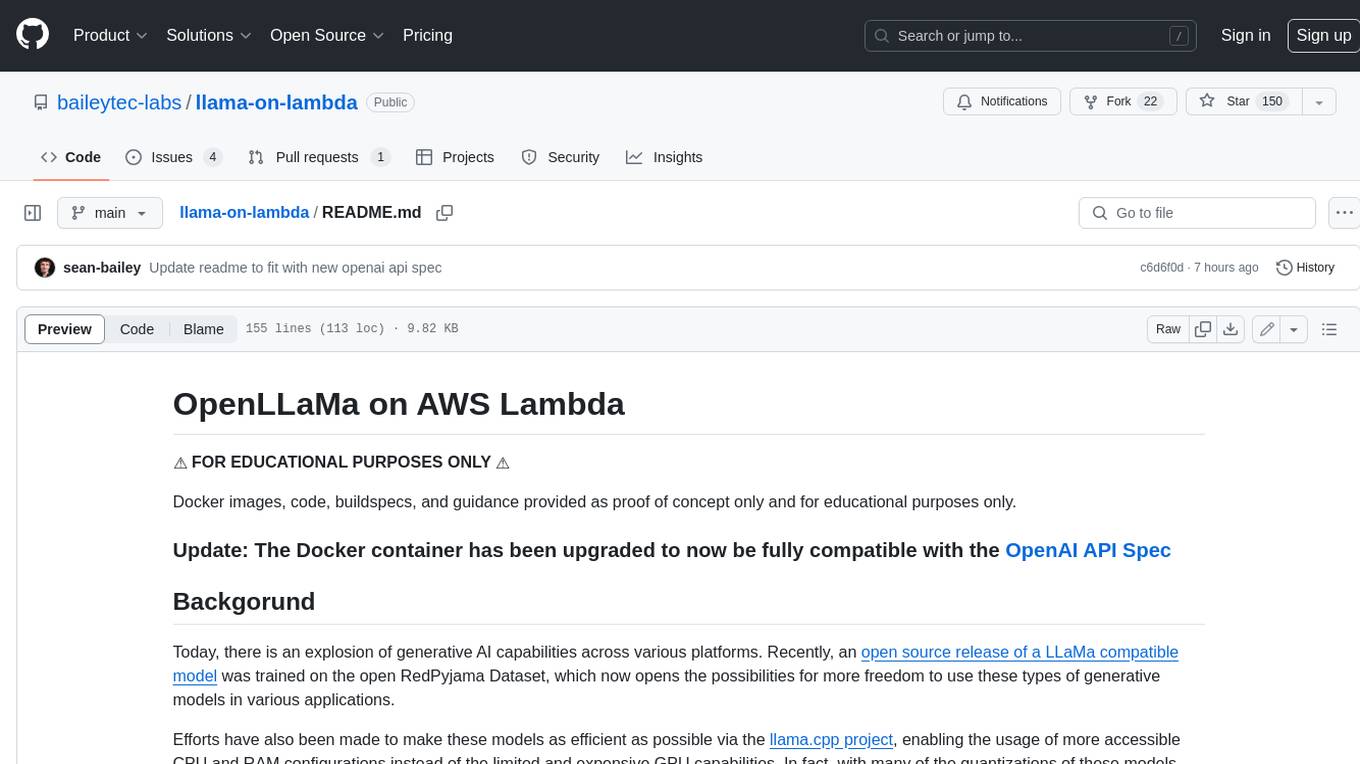
llama-on-lambda
This project provides a proof of concept for deploying a scalable, serverless LLM Generative AI inference engine on AWS Lambda. It leverages the llama.cpp project to enable the usage of more accessible CPU and RAM configurations instead of limited and expensive GPU capabilities. By deploying a container with the llama.cpp converted models onto AWS Lambda, this project offers the advantages of scale, minimizing cost, and maximizing compute availability. The project includes AWS CDK code to create and deploy a Lambda function leveraging your model of choice, with a FastAPI frontend accessible from a Lambda URL. It is important to note that you will need ggml quantized versions of your model and model sizes under 6GB, as your inference RAM requirements cannot exceed 9GB or your Lambda function will fail.
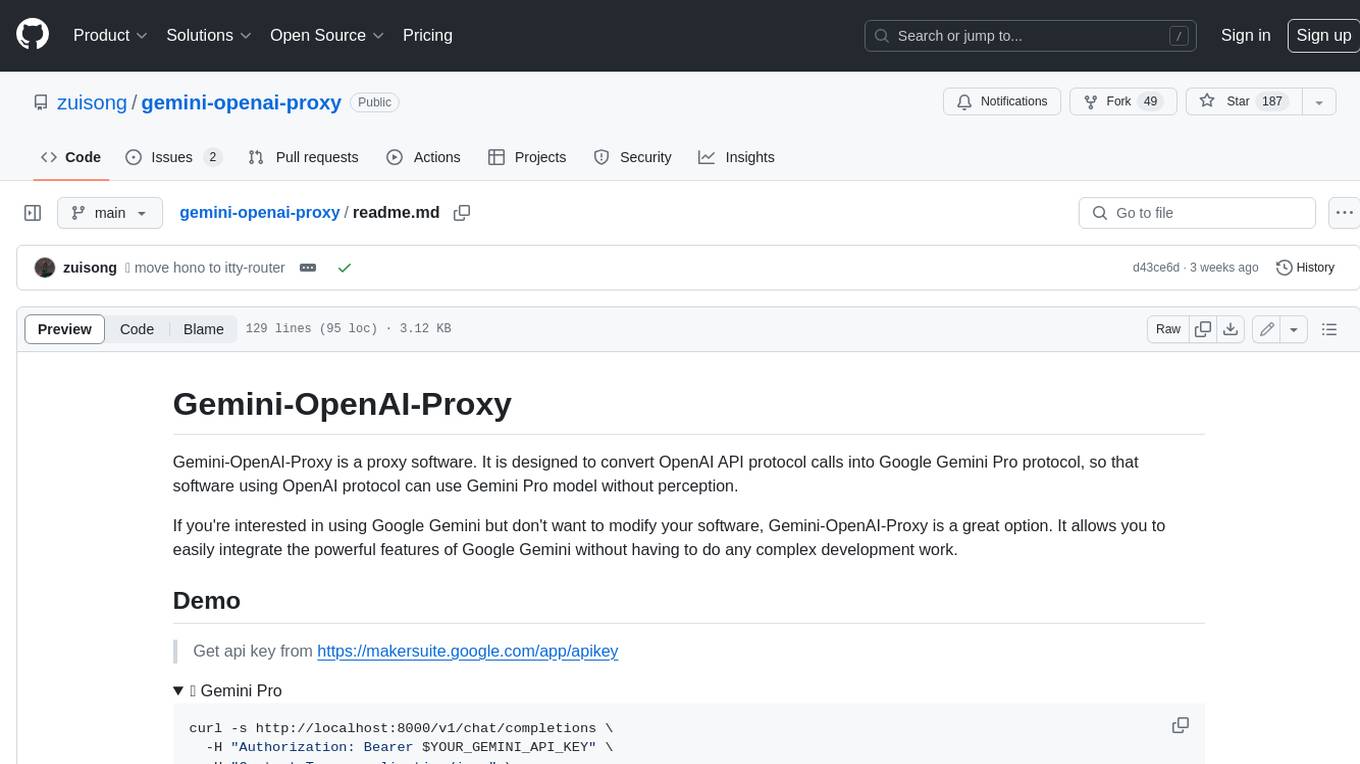
gemini-openai-proxy
Gemini-OpenAI-Proxy is a proxy software designed to convert OpenAI API protocol calls into Google Gemini Pro protocol, allowing software using OpenAI protocol to utilize Gemini Pro models seamlessly. It provides an easy integration of Gemini Pro's powerful features without the need for complex development work.
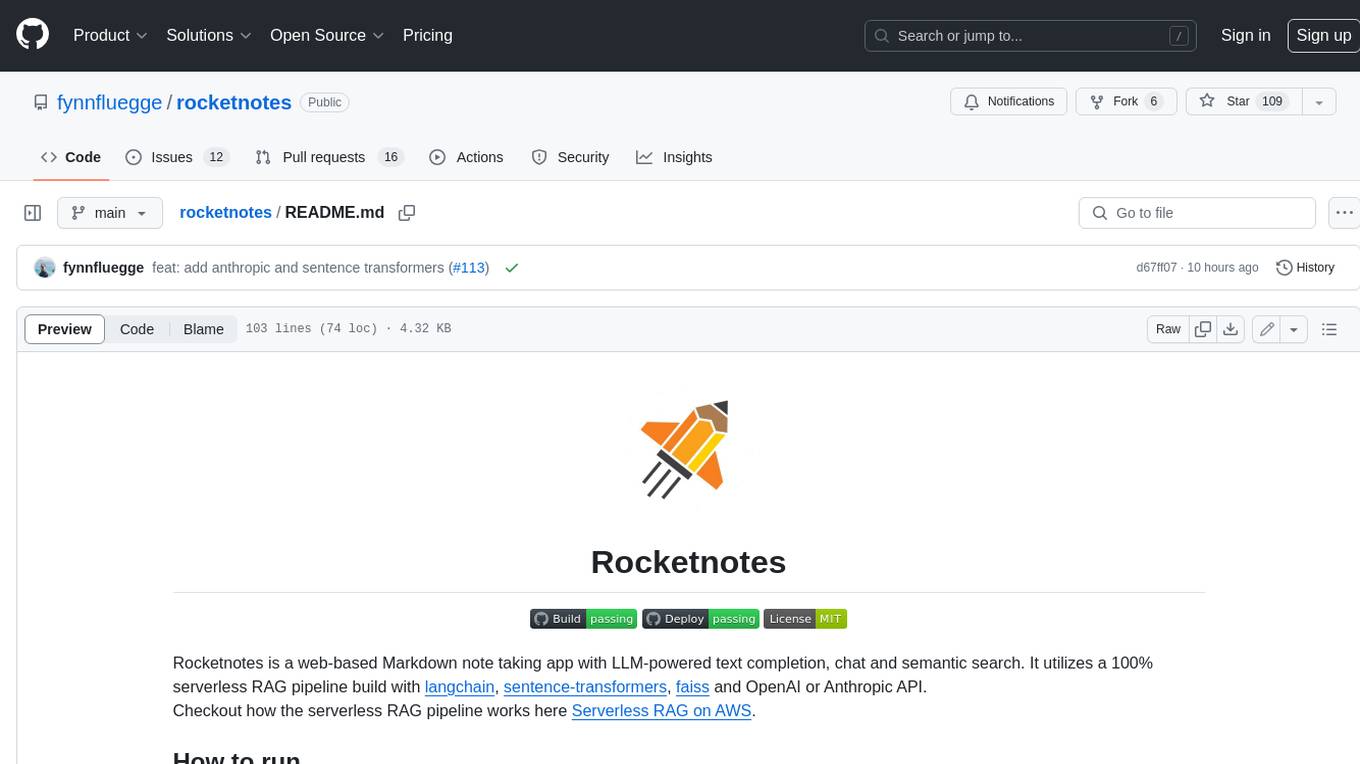
rocketnotes
Rocketnotes is a web-based Markdown note taking app with LLM-powered text completion, chat and semantic search. It utilizes a 100% serverless RAG pipeline build with langchain, sentence-transformers, faiss and OpenAI or Anthropic API.
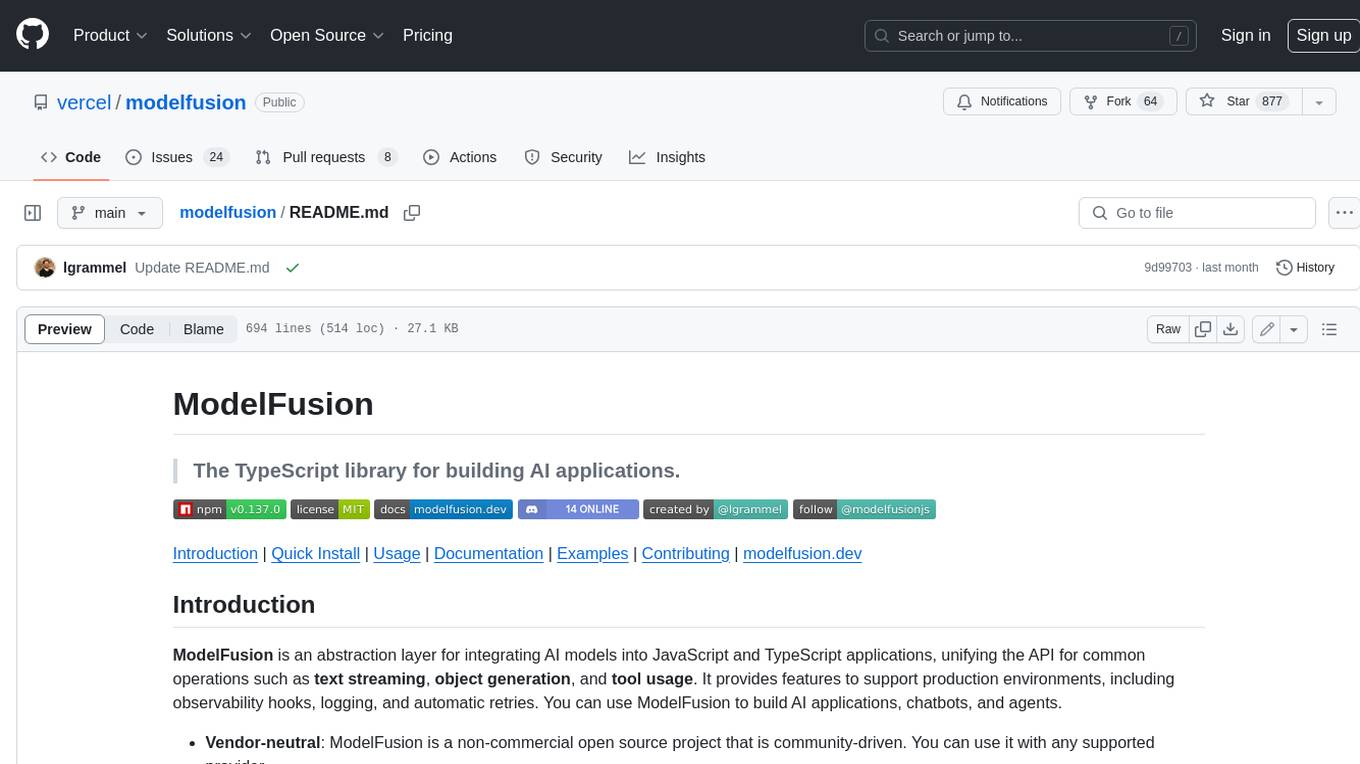
modelfusion
ModelFusion is an abstraction layer for integrating AI models into JavaScript and TypeScript applications, unifying the API for common operations such as text streaming, object generation, and tool usage. It provides features to support production environments, including observability hooks, logging, and automatic retries. You can use ModelFusion to build AI applications, chatbots, and agents. ModelFusion is a non-commercial open source project that is community-driven. You can use it with any supported provider. ModelFusion supports a wide range of models including text generation, image generation, vision, text-to-speech, speech-to-text, and embedding models. ModelFusion infers TypeScript types wherever possible and validates model responses. ModelFusion provides an observer framework and logging support. ModelFusion ensures seamless operation through automatic retries, throttling, and error handling mechanisms. ModelFusion is fully tree-shakeable, can be used in serverless environments, and only uses a minimal set of dependencies.
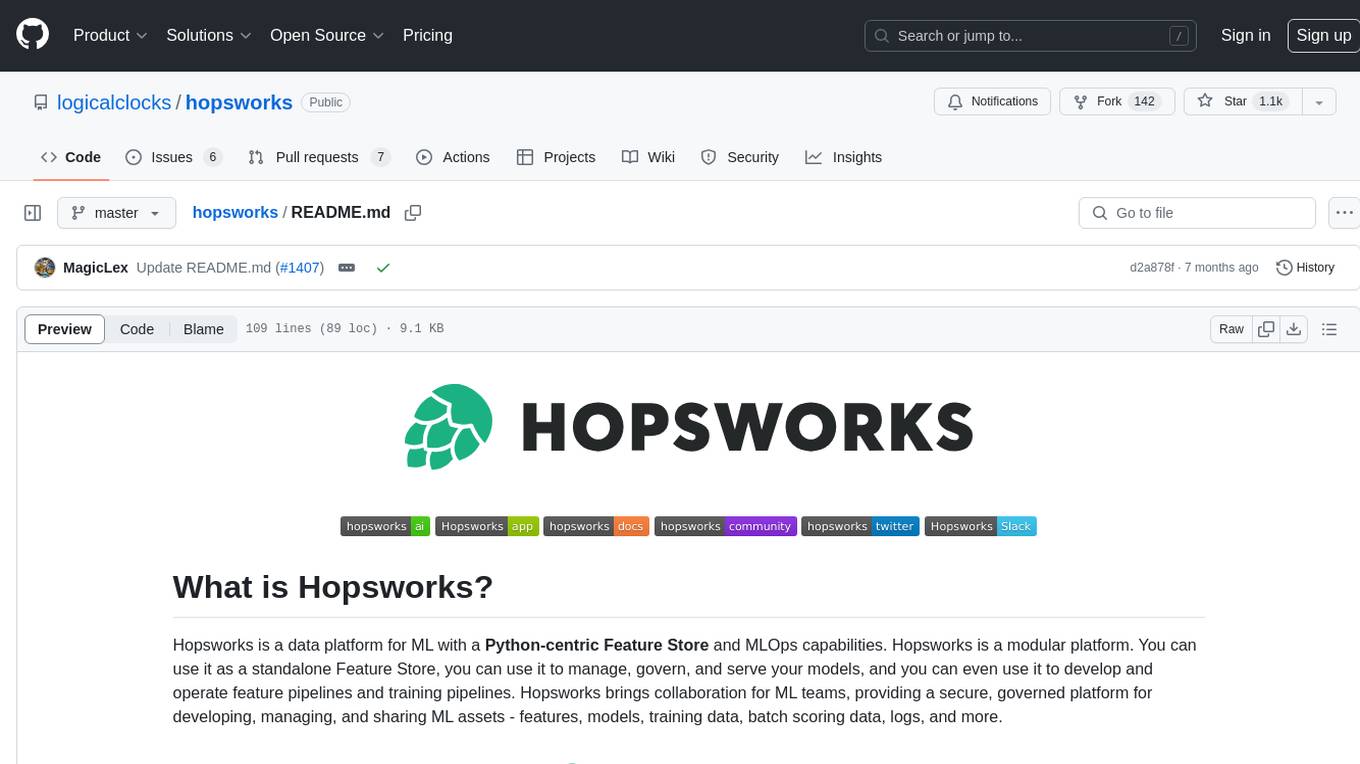
hopsworks
Hopsworks is a data platform for ML with a Python-centric Feature Store and MLOps capabilities. It provides collaboration for ML teams, offering a secure, governed platform for developing, managing, and sharing ML assets. Hopsworks supports project-based multi-tenancy, team collaboration, development tools for Data Science, and is available on any platform including managed cloud services and on-premise installations. The platform enables end-to-end responsibility from raw data to managed features and models, supports versioning, lineage, and provenance, and facilitates the complete MLOps life cycle.
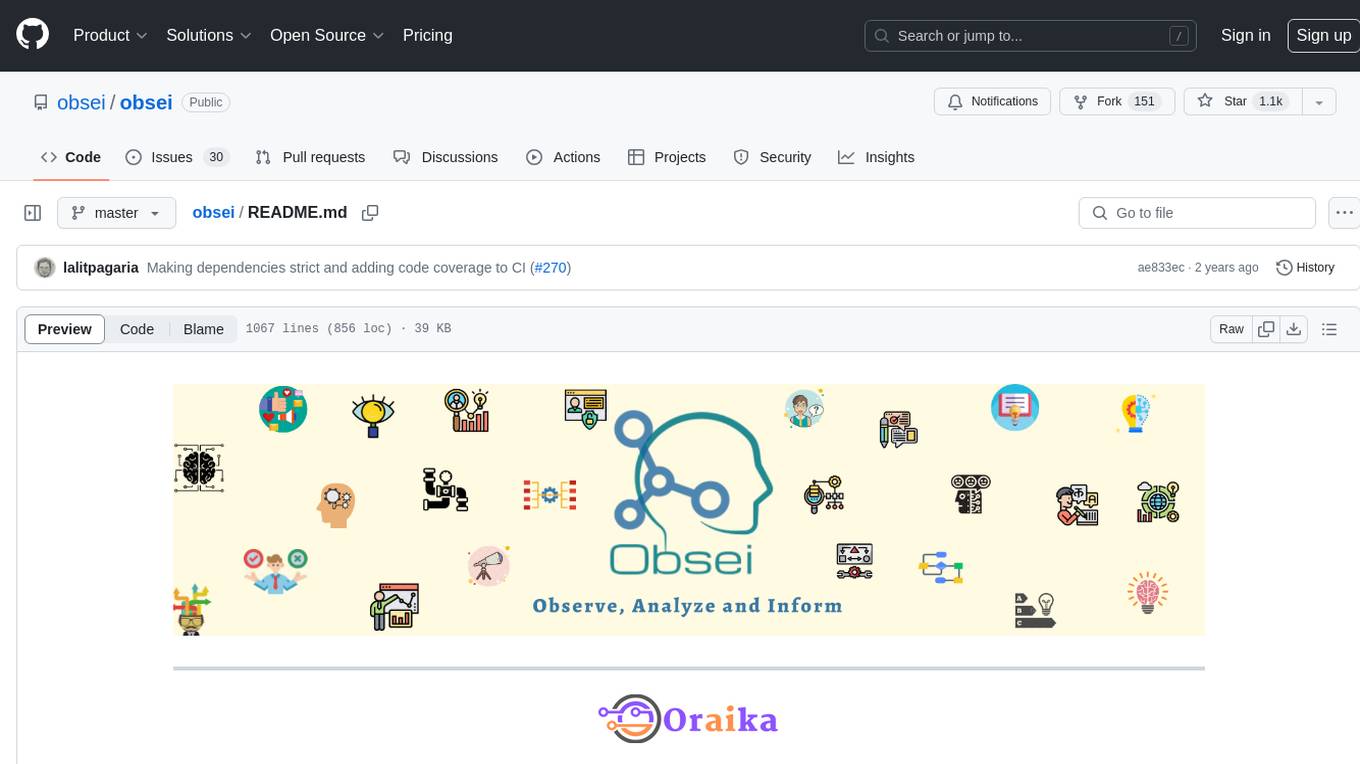
obsei
Obsei is an open-source, low-code, AI powered automation tool that consists of an Observer to collect unstructured data from various sources, an Analyzer to analyze the collected data with various AI tasks, and an Informer to send analyzed data to various destinations. The tool is suitable for scheduled jobs or serverless applications as all Observers can store their state in databases. Obsei is still in alpha stage, so caution is advised when using it in production. The tool can be used for social listening, alerting/notification, automatic customer issue creation, extraction of deeper insights from feedbacks, market research, dataset creation for various AI tasks, and more based on creativity.
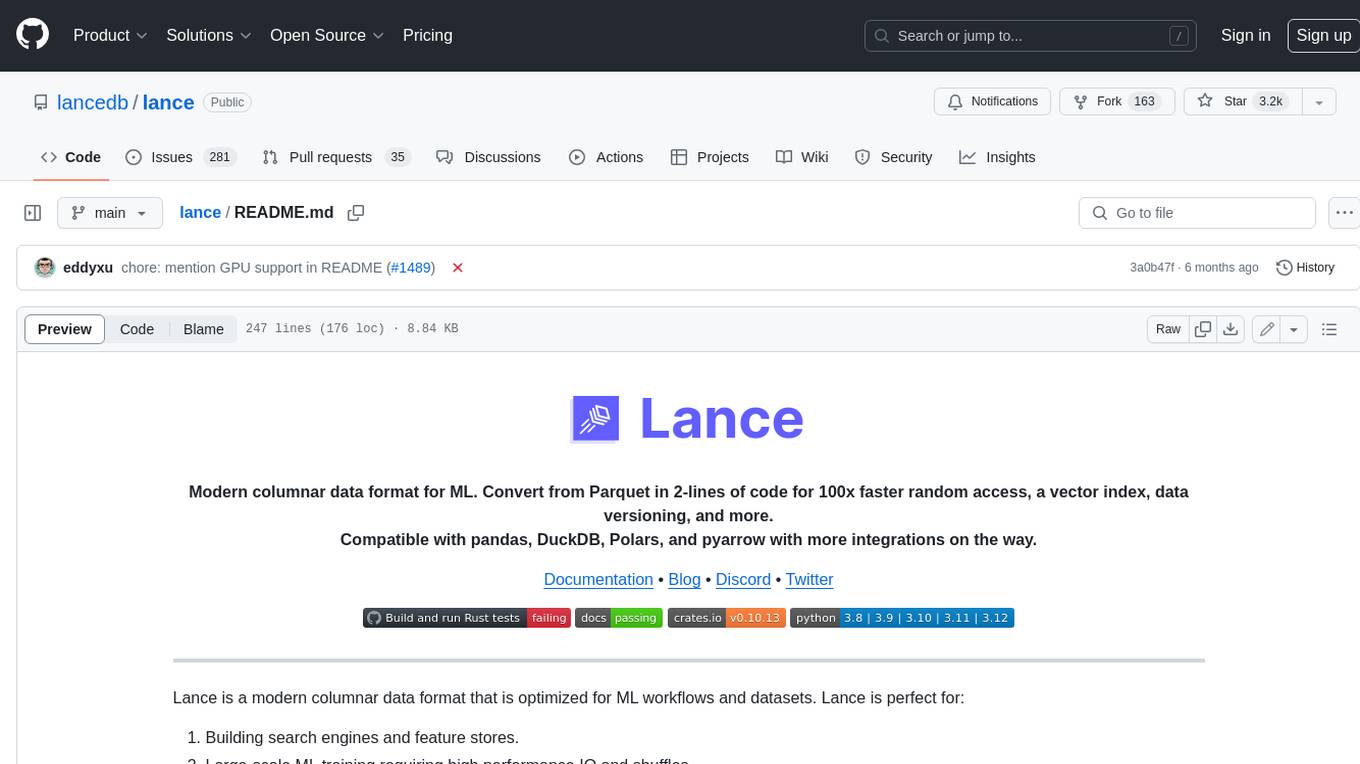
lance
Lance is a modern columnar data format optimized for ML workflows and datasets. It offers high-performance random access, vector search, zero-copy automatic versioning, and ecosystem integrations with Apache Arrow, Pandas, Polars, and DuckDB. Lance is designed to address the challenges of the ML development cycle, providing a unified data format for collection, exploration, analytics, feature engineering, training, evaluation, deployment, and monitoring. It aims to reduce data silos and streamline the ML development process.
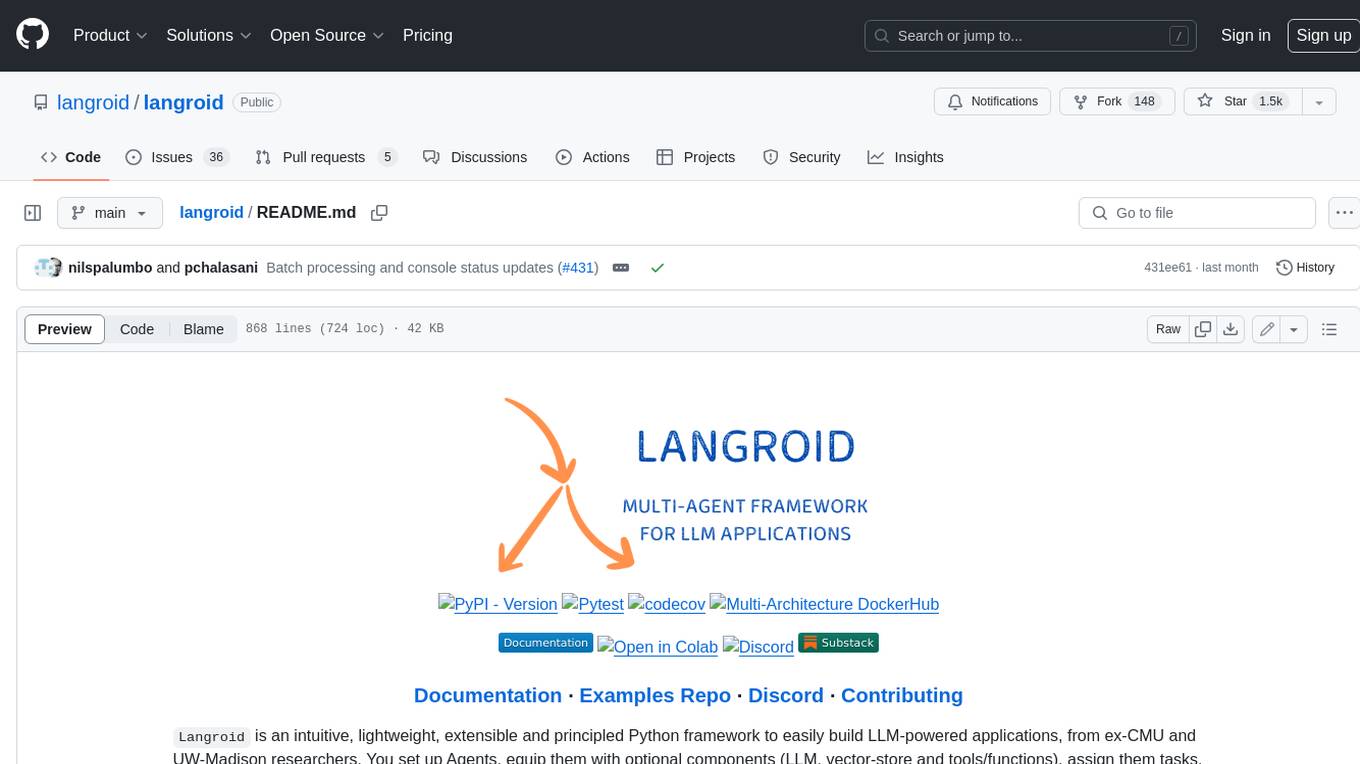
langroid
Langroid is a Python framework that makes it easy to build LLM-powered applications. It uses a multi-agent paradigm inspired by the Actor Framework, where you set up Agents, equip them with optional components (LLM, vector-store and tools/functions), assign them tasks, and have them collaboratively solve a problem by exchanging messages. Langroid is a fresh take on LLM app-development, where considerable thought has gone into simplifying the developer experience; it does not use Langchain.
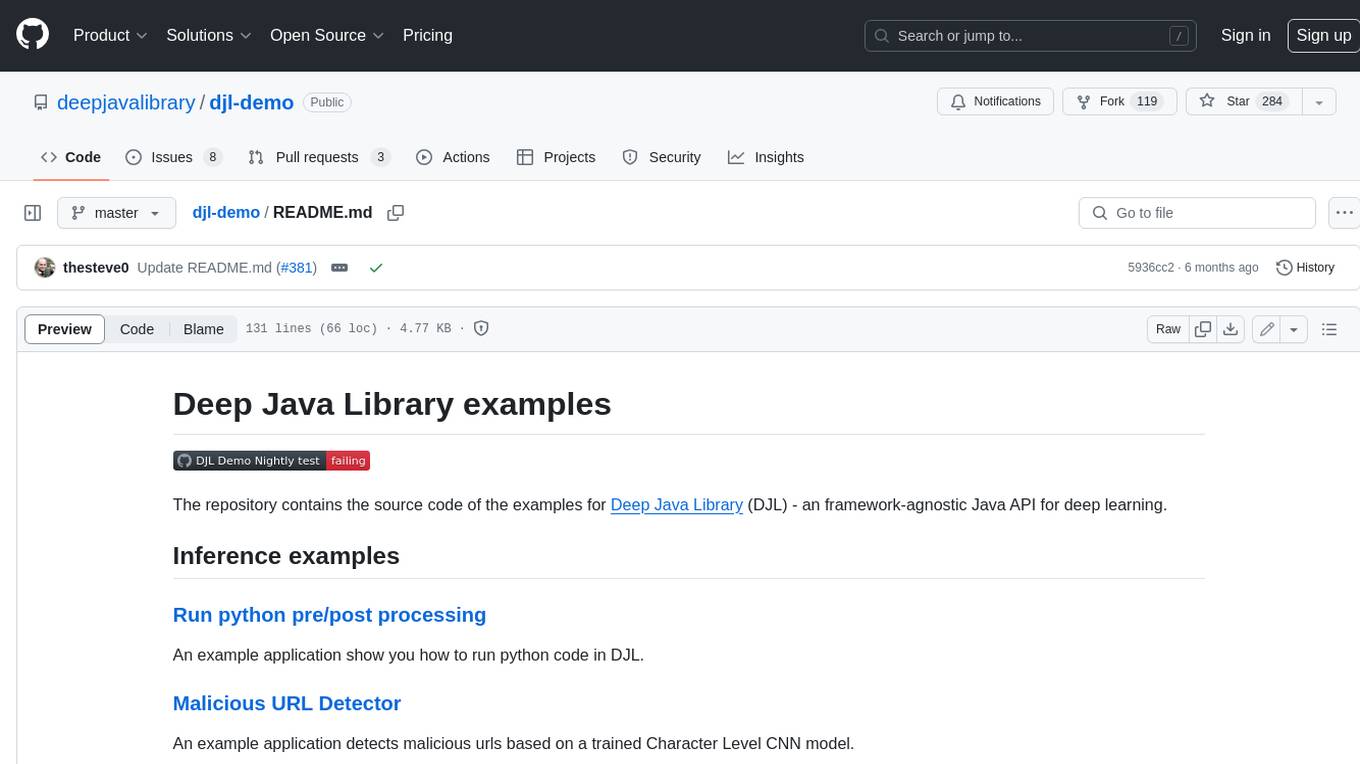
djl-demo
The Deep Java Library (DJL) is a framework-agnostic Java API for deep learning. It provides a unified interface to popular deep learning frameworks such as TensorFlow, PyTorch, and MXNet. DJL makes it easy to develop deep learning applications in Java, and it can be used for a variety of tasks, including image classification, object detection, natural language processing, and speech recognition.
4 - OpenAI Gpts
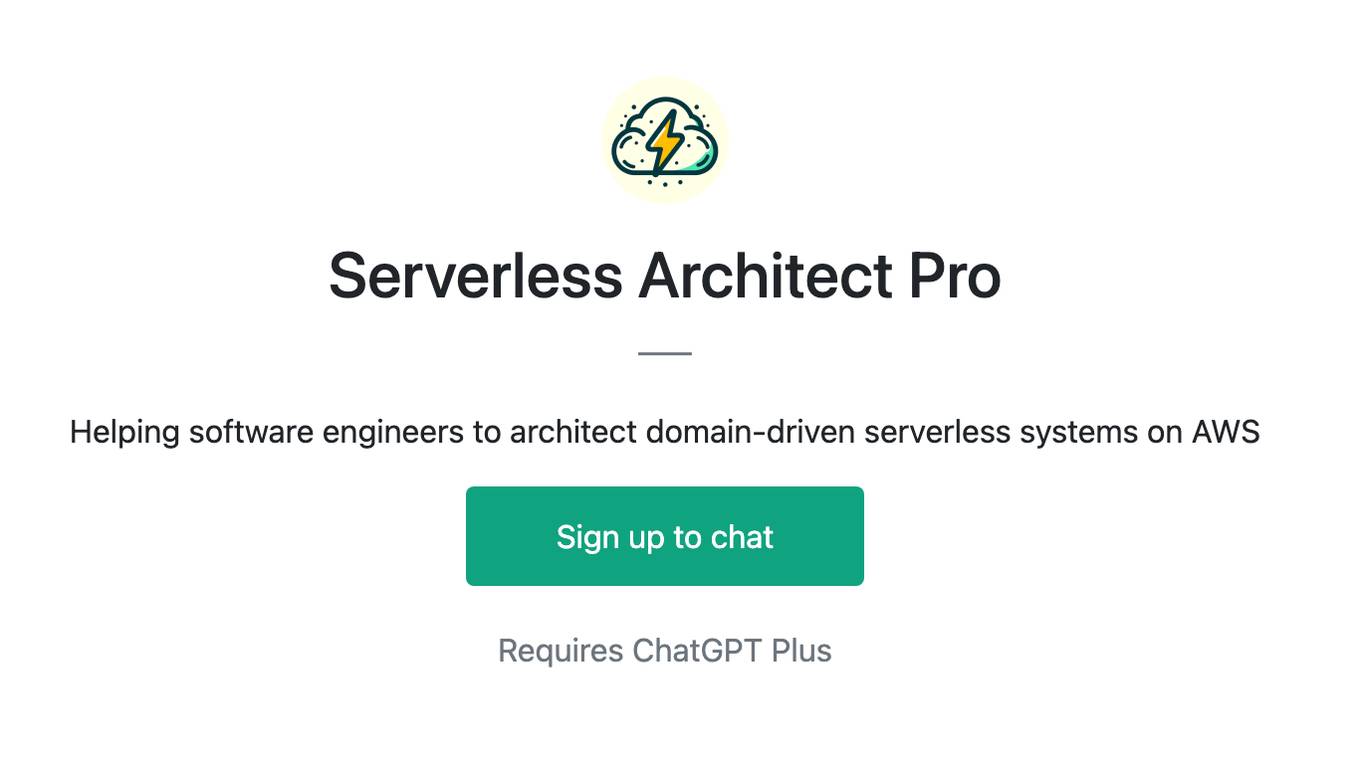
Serverless Architect Pro
Helping software engineers to architect domain-driven serverless systems on AWS
